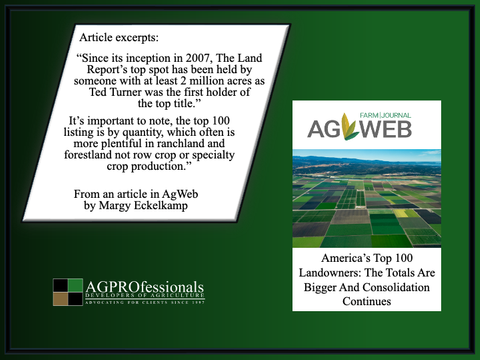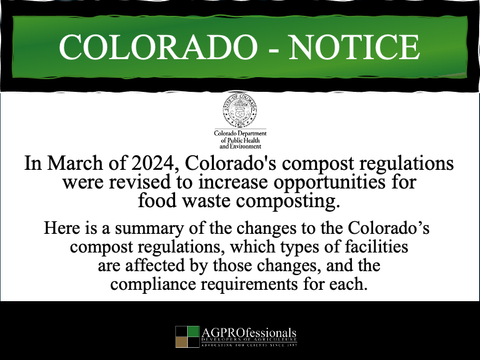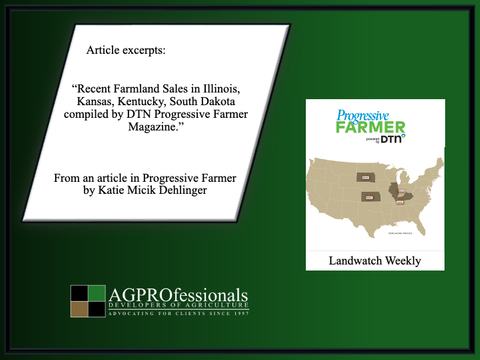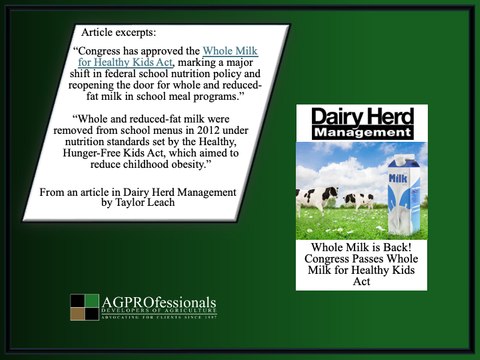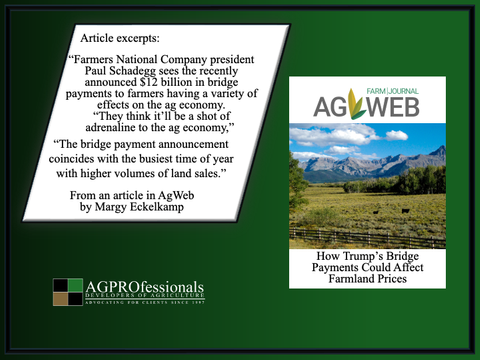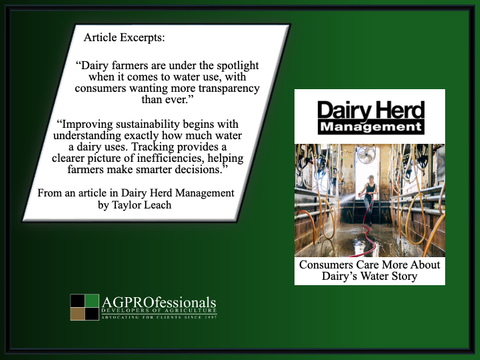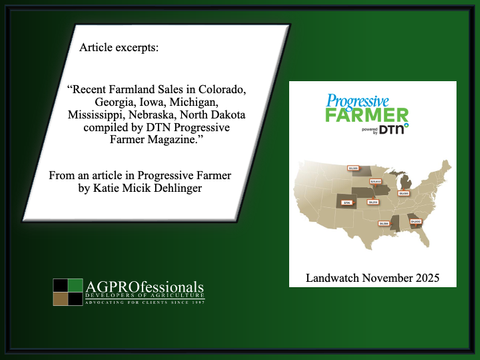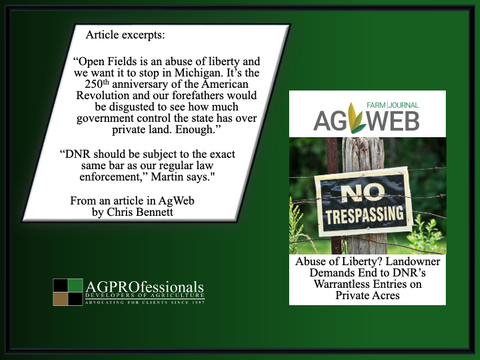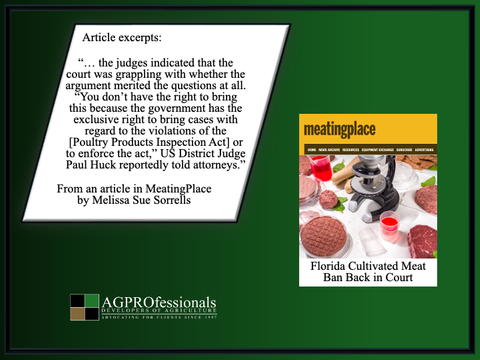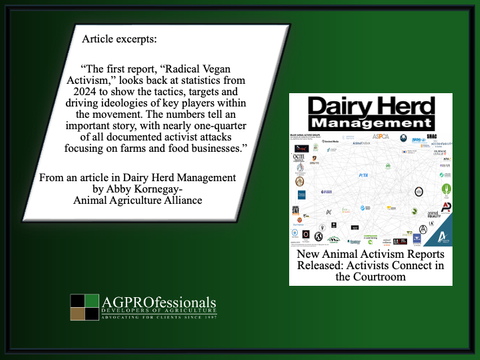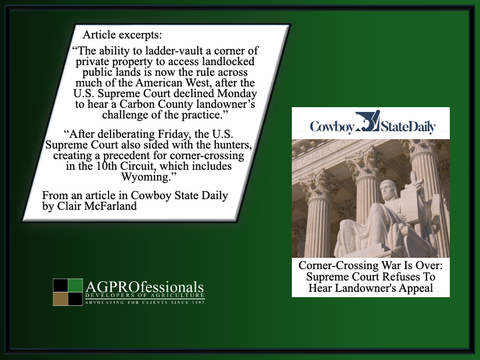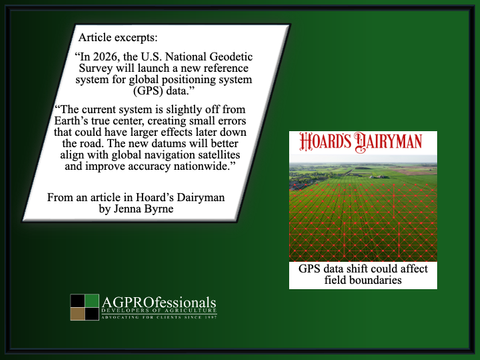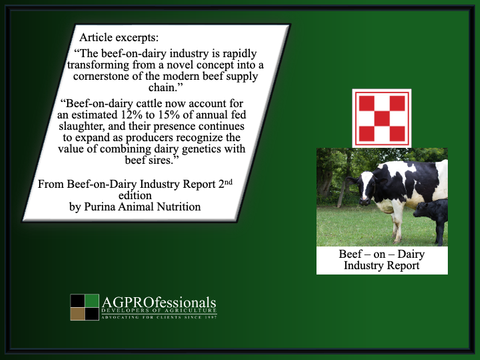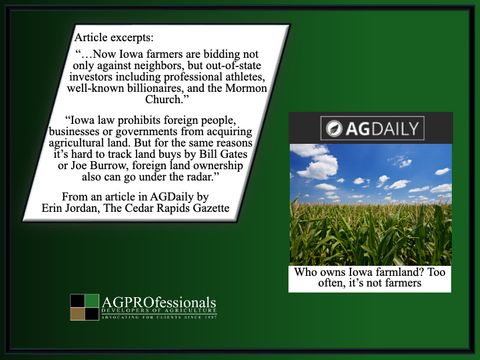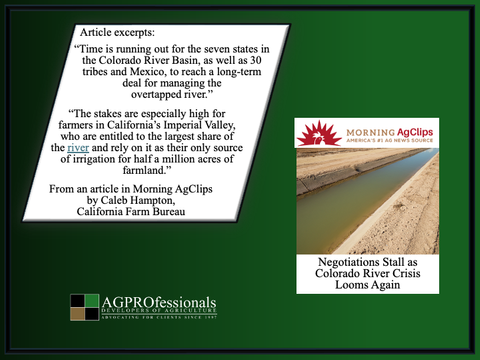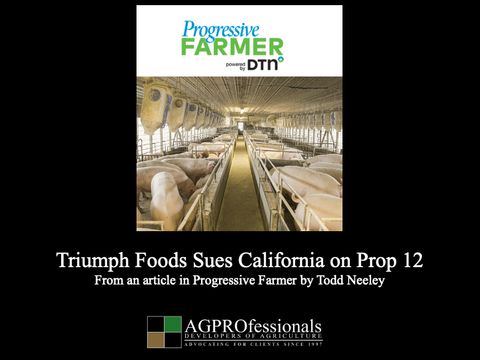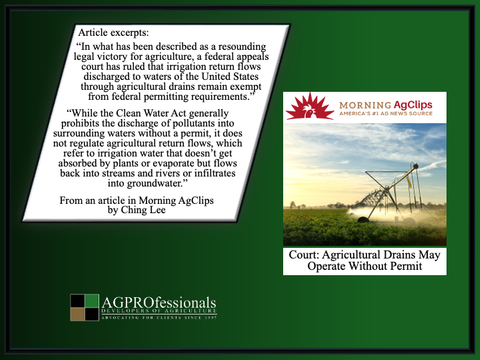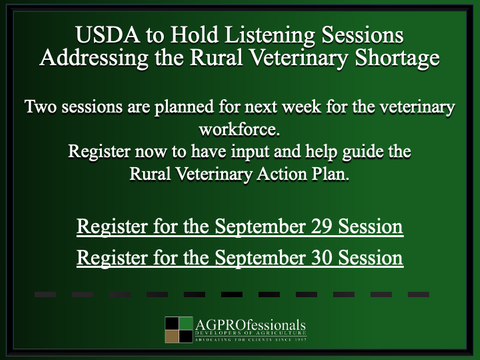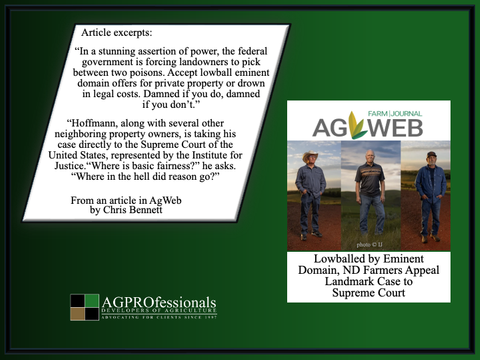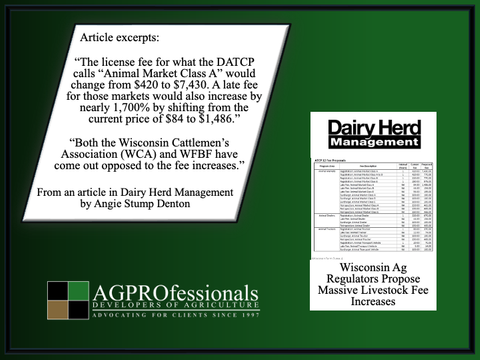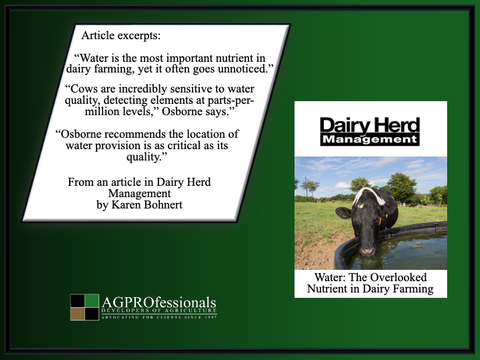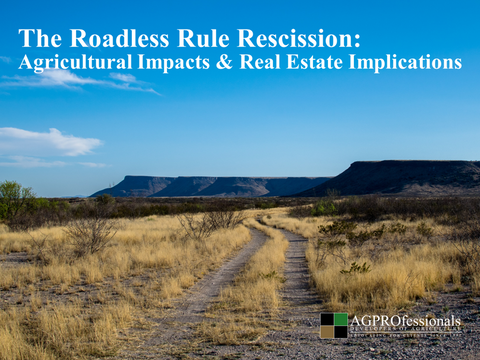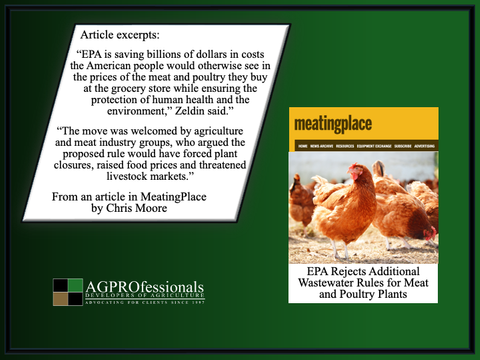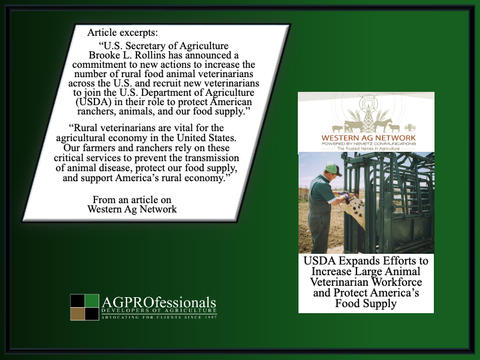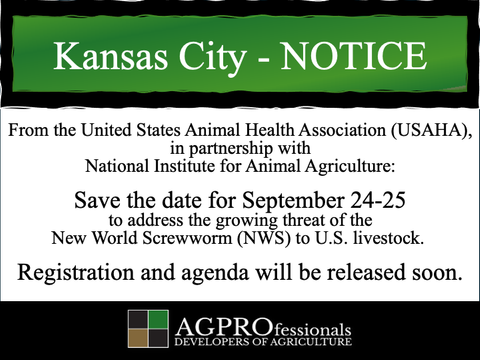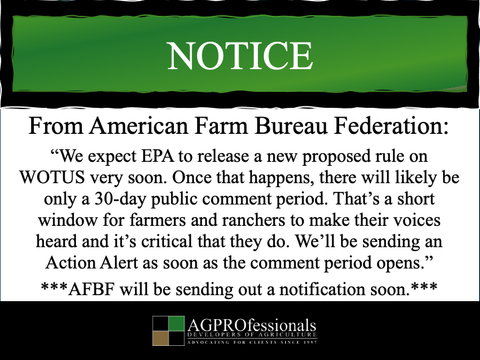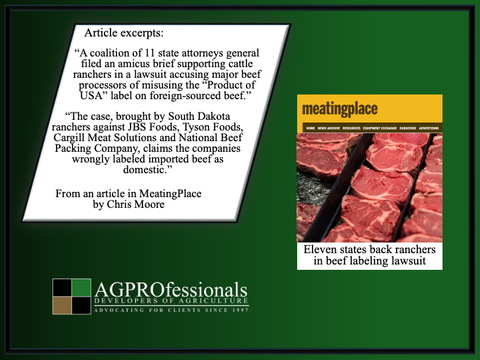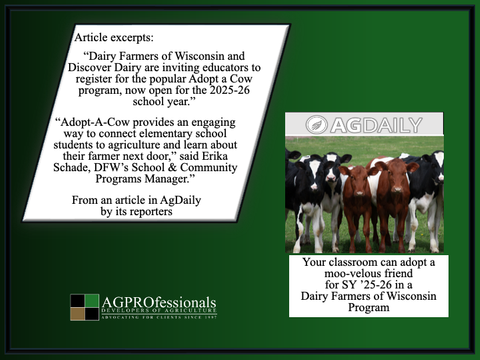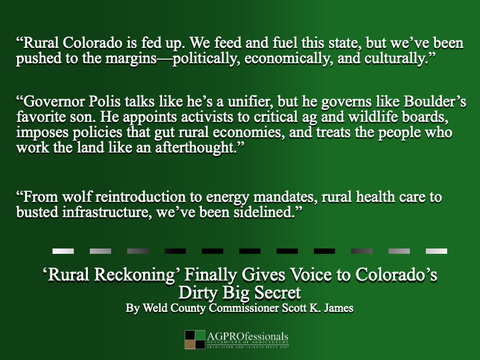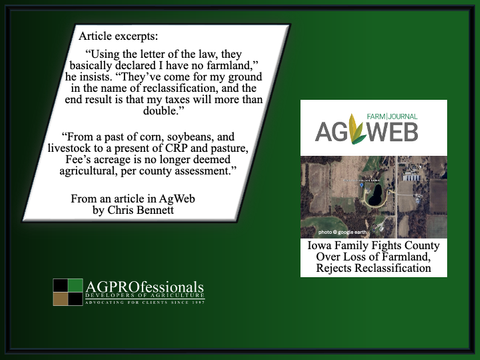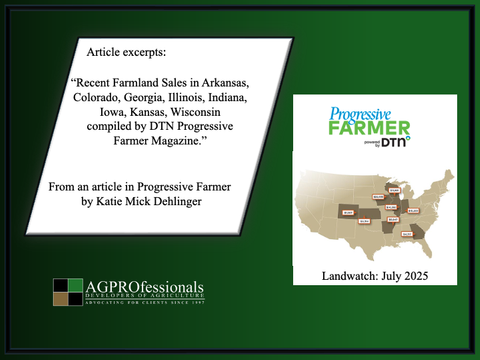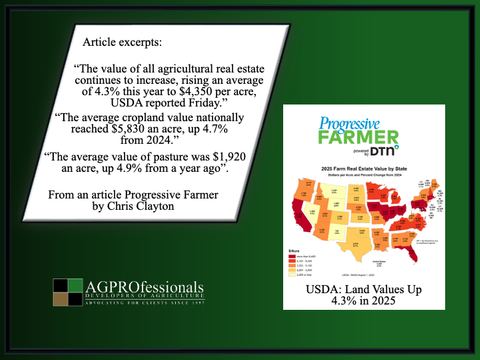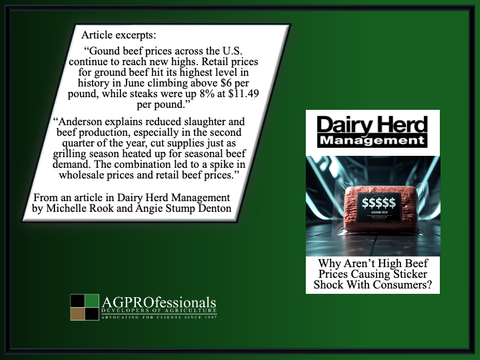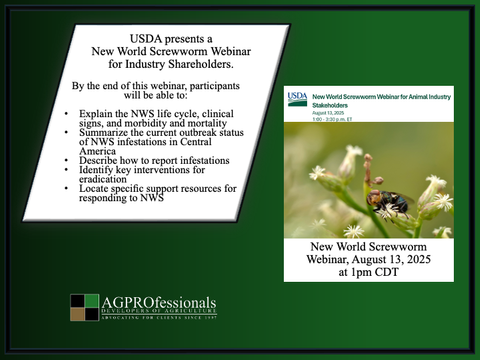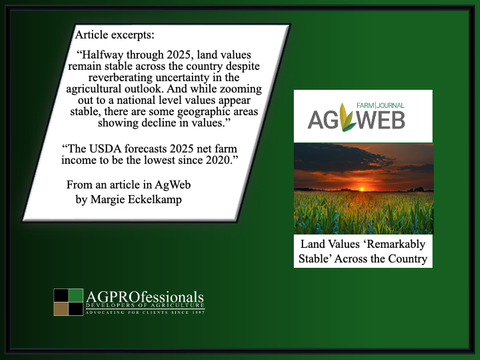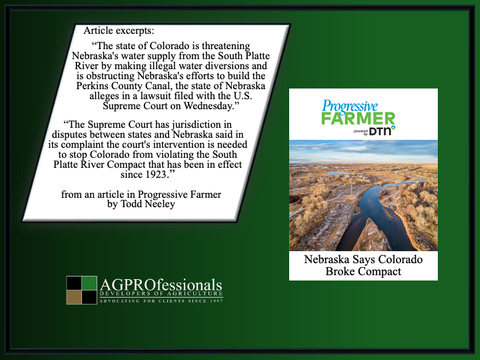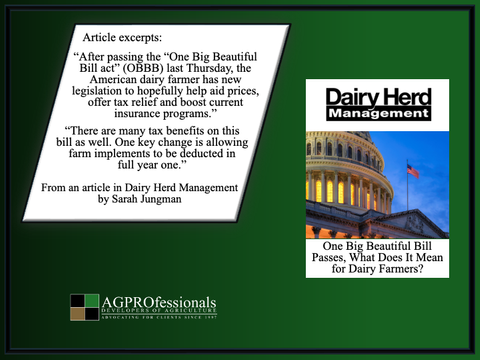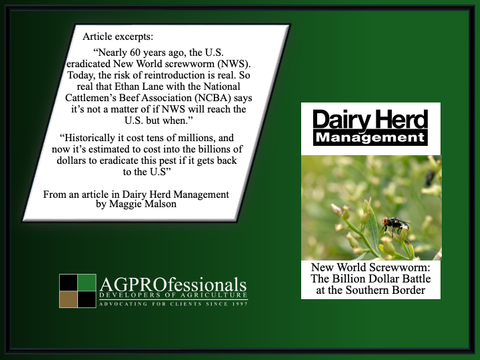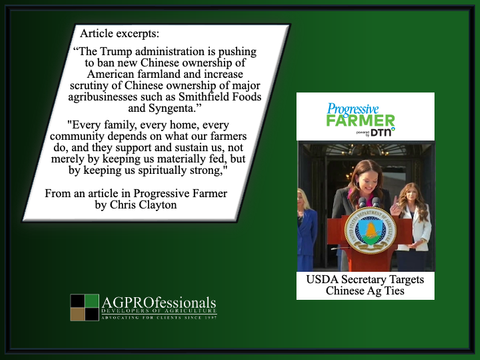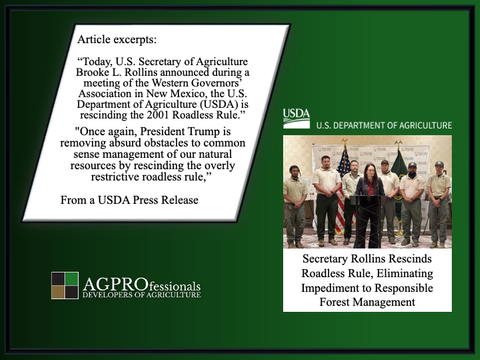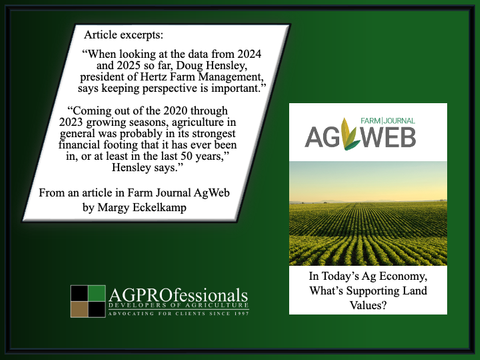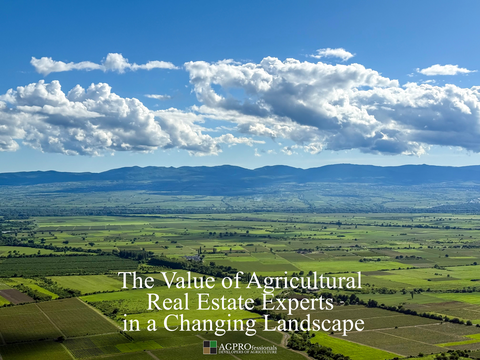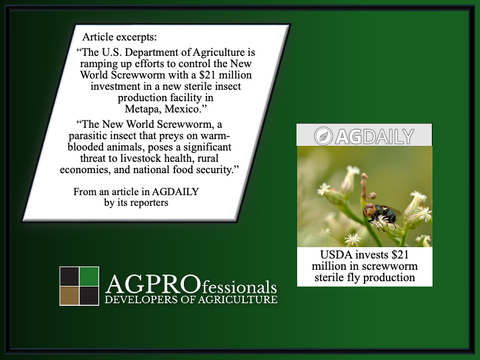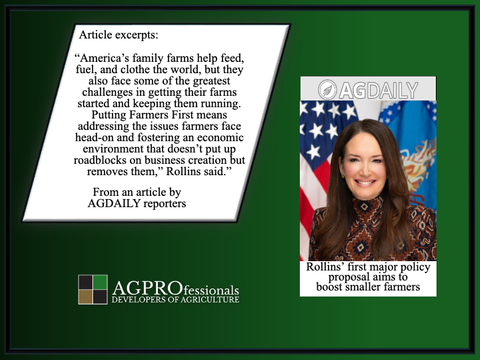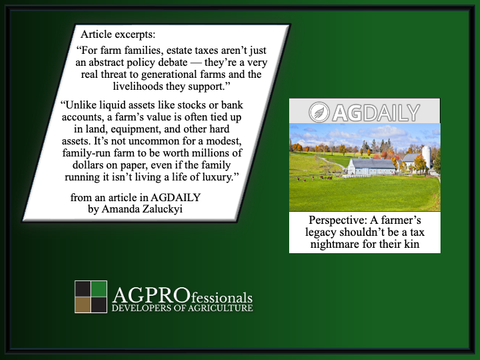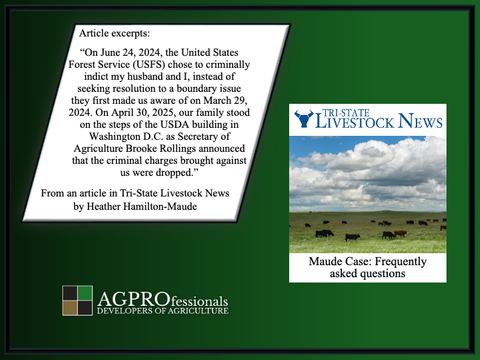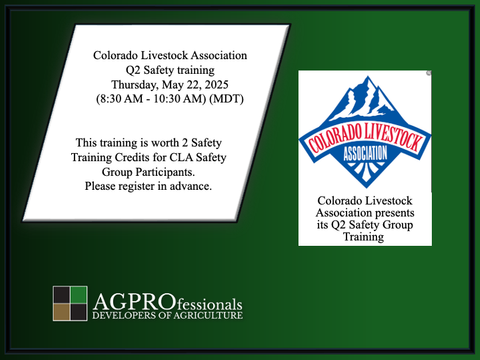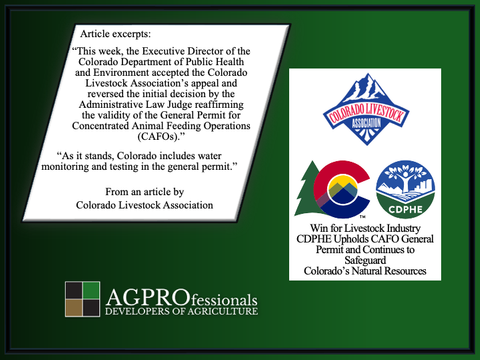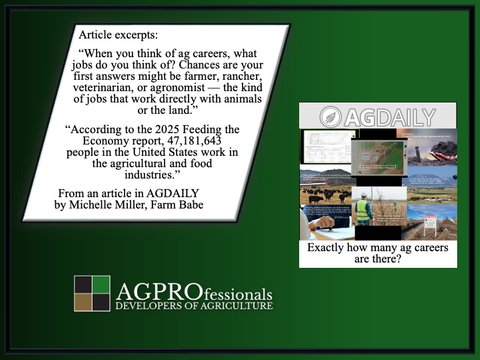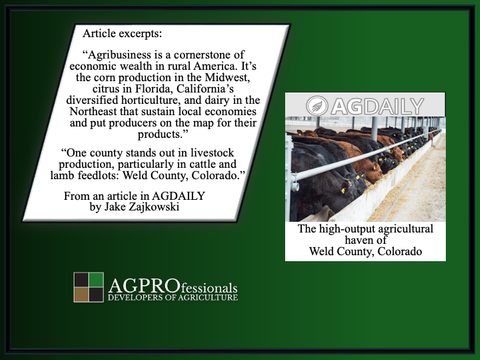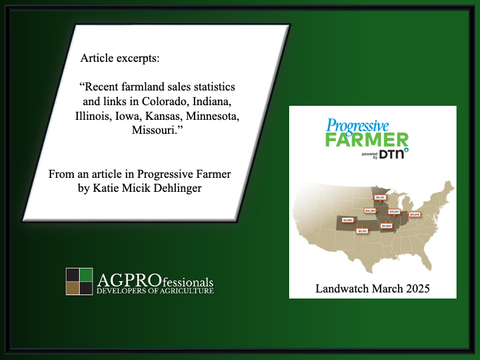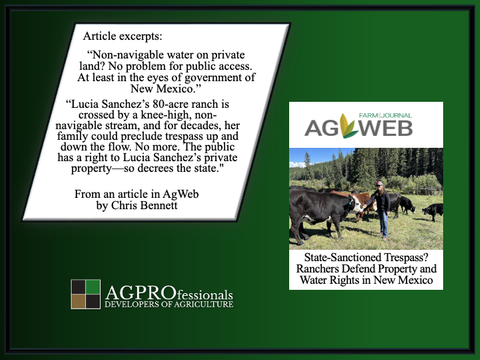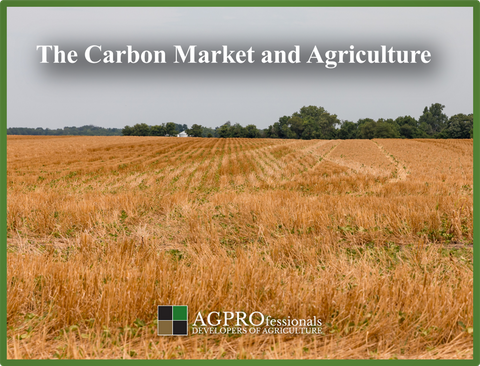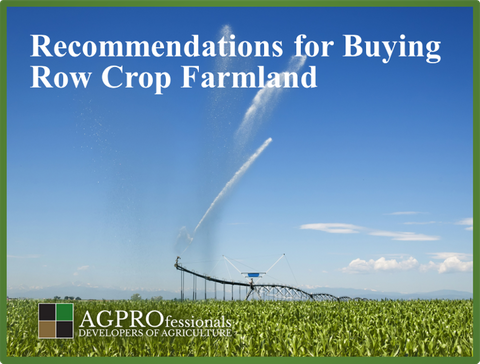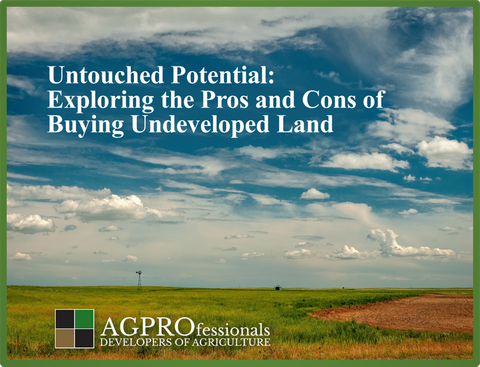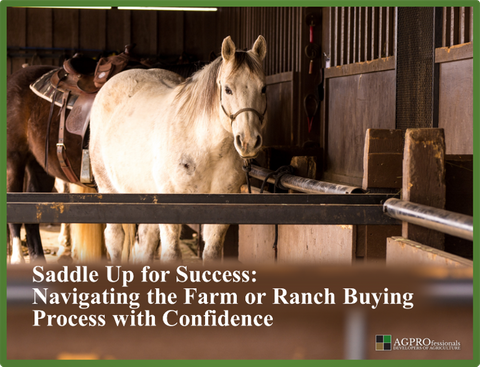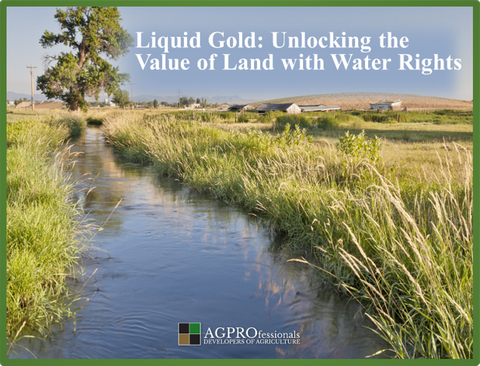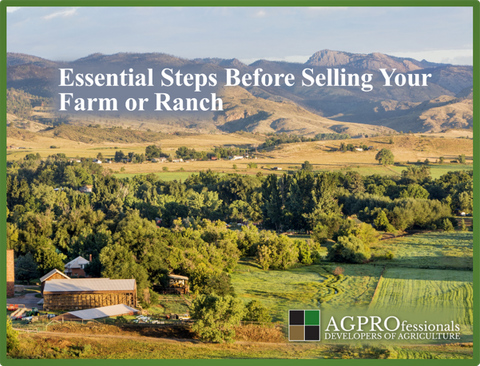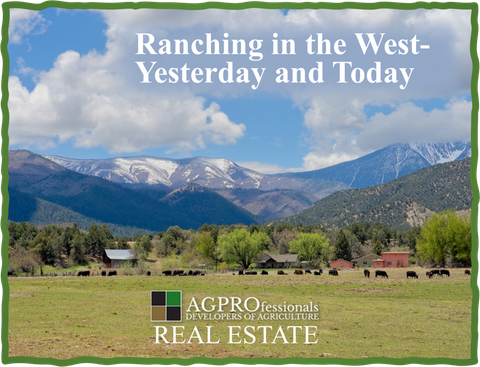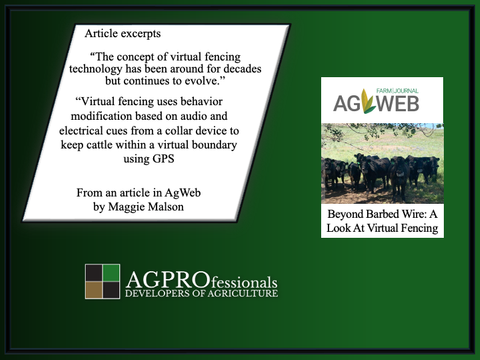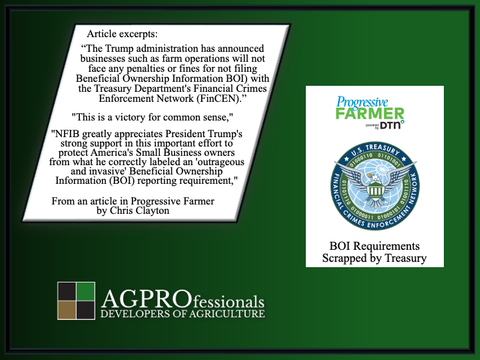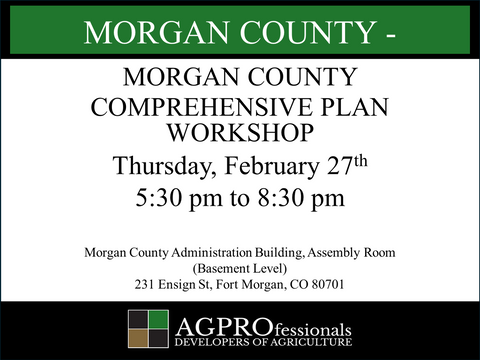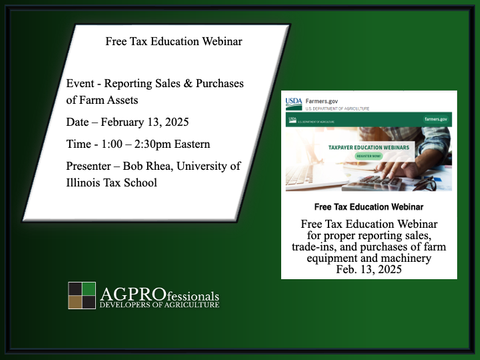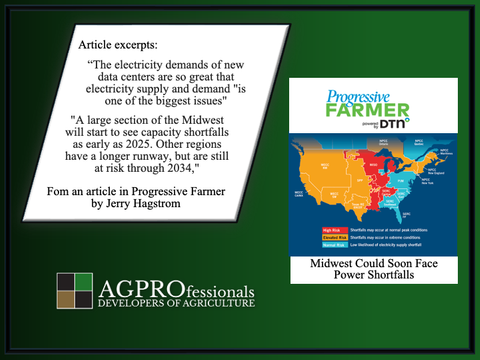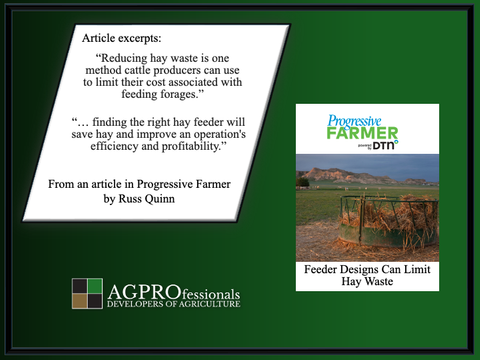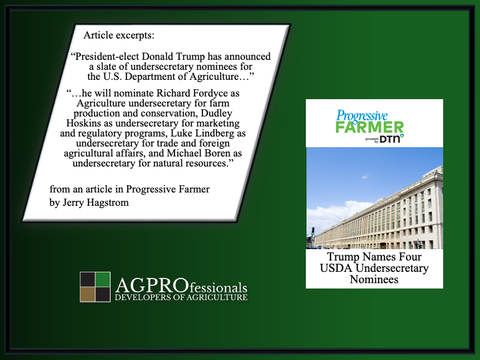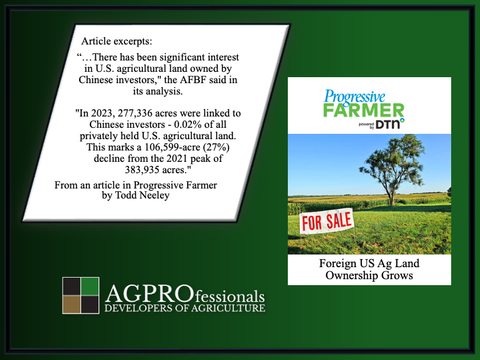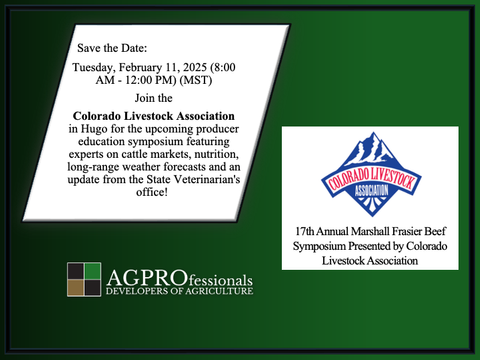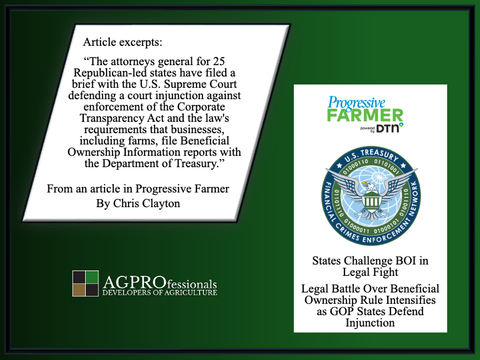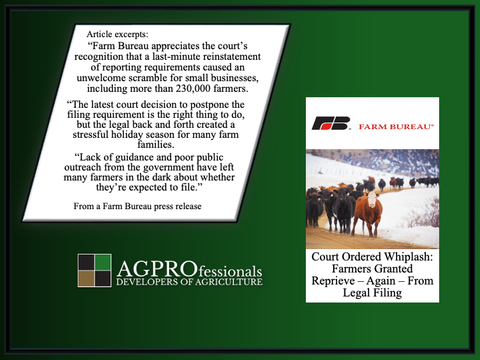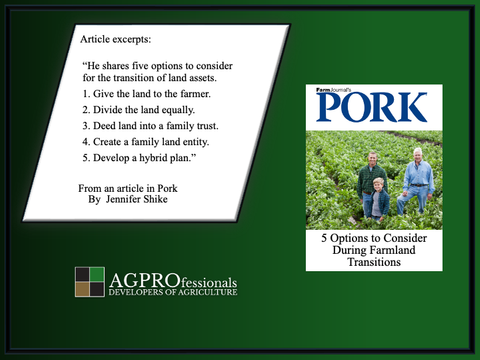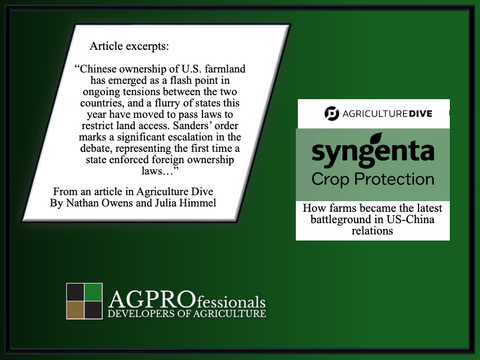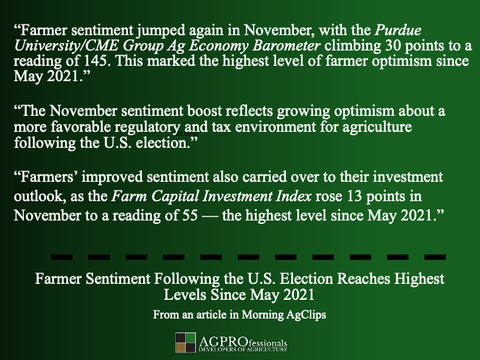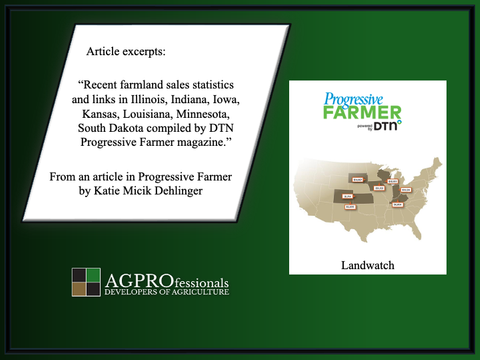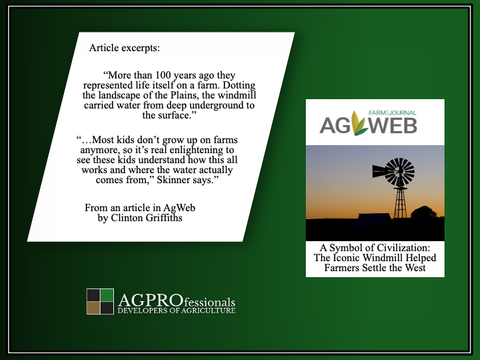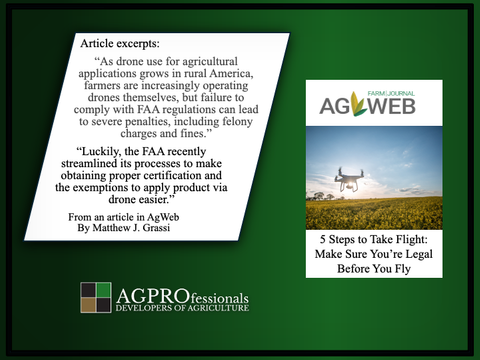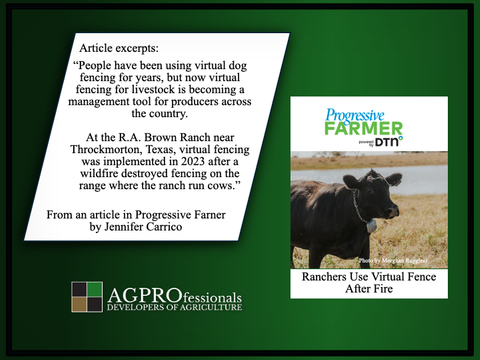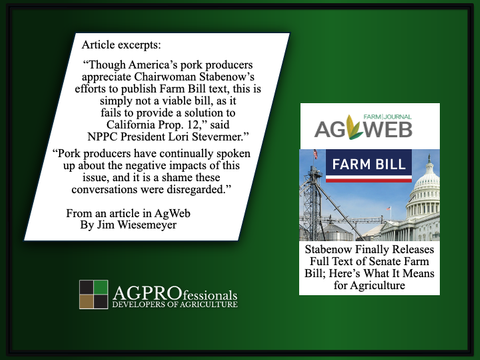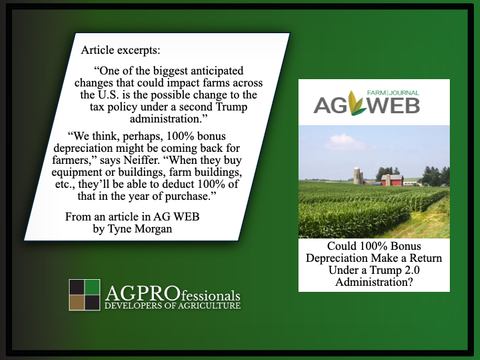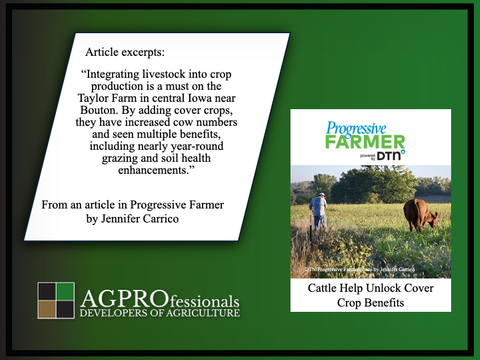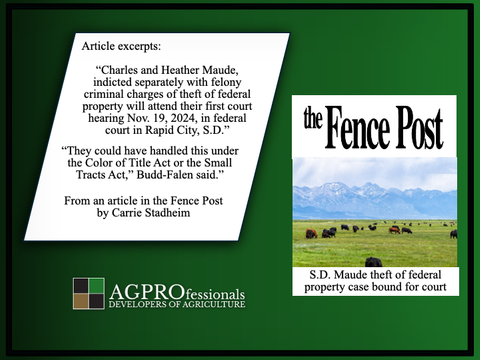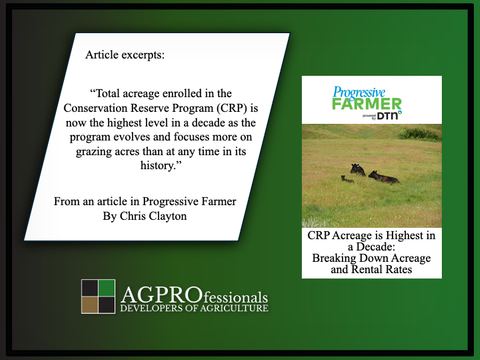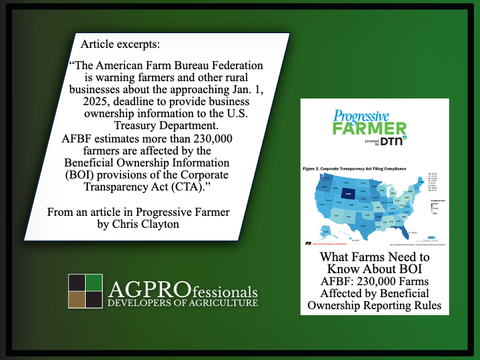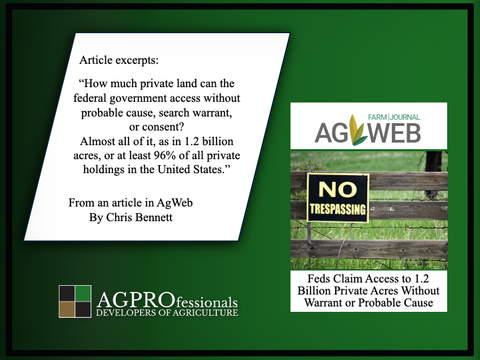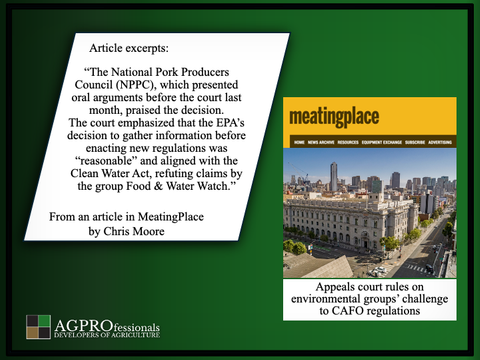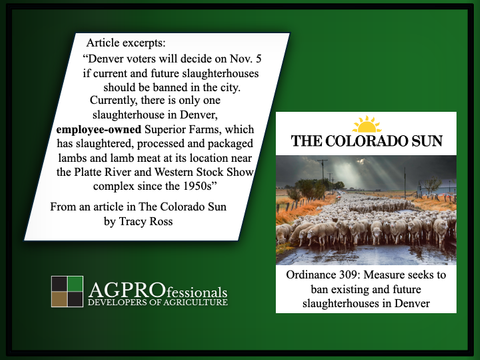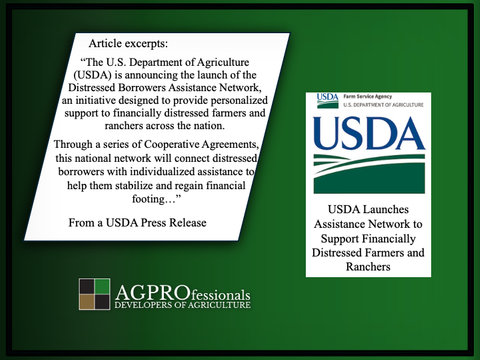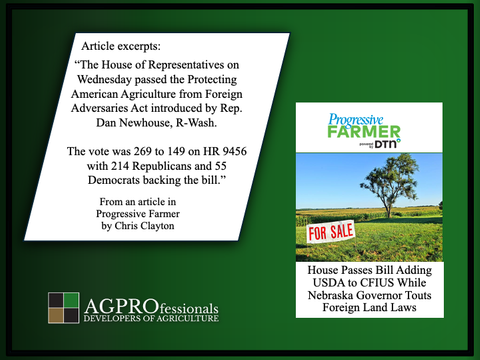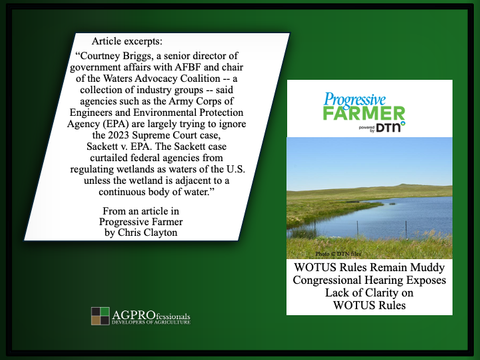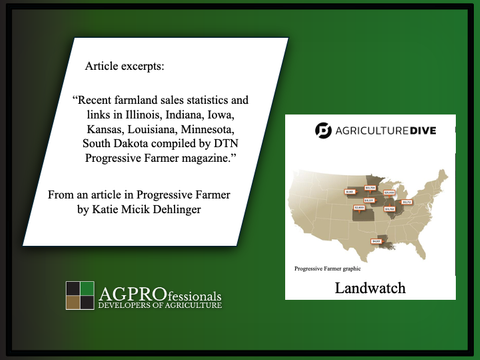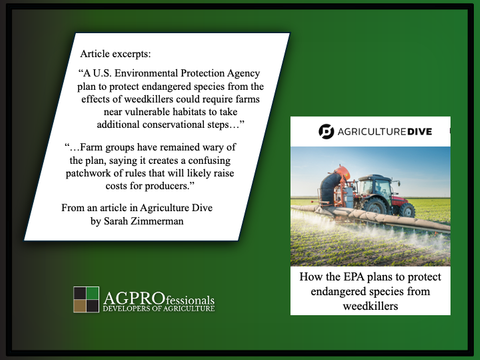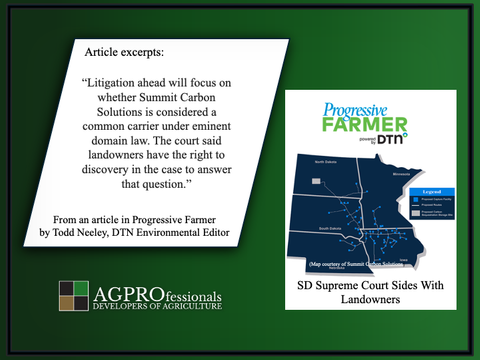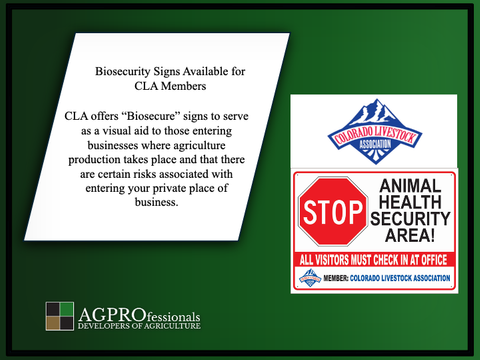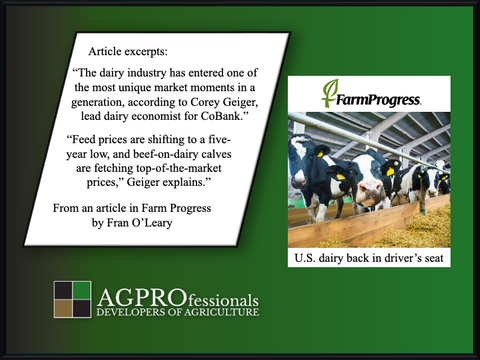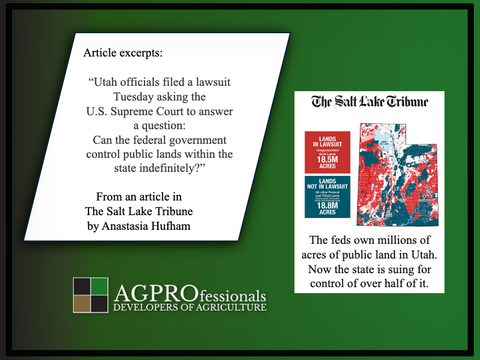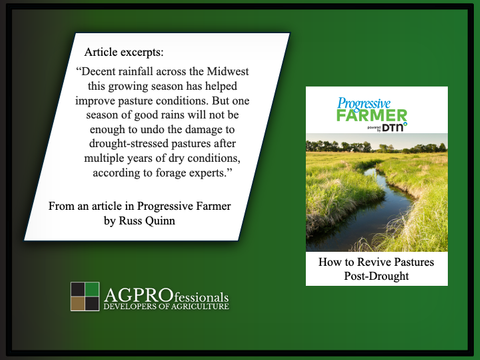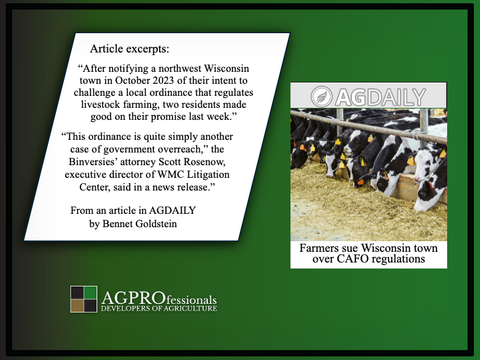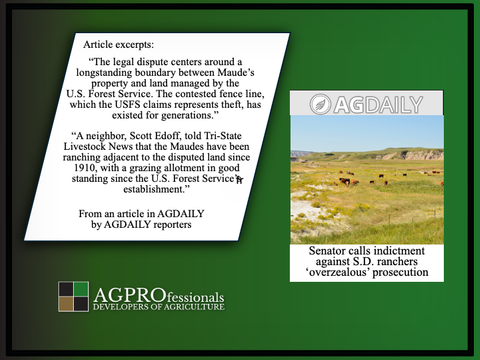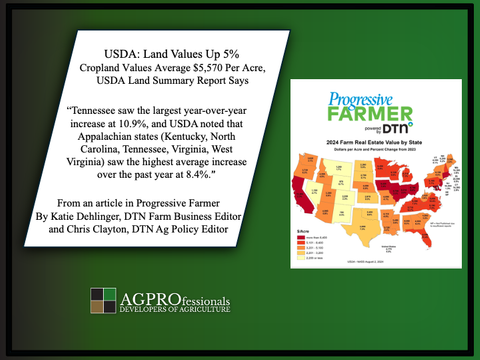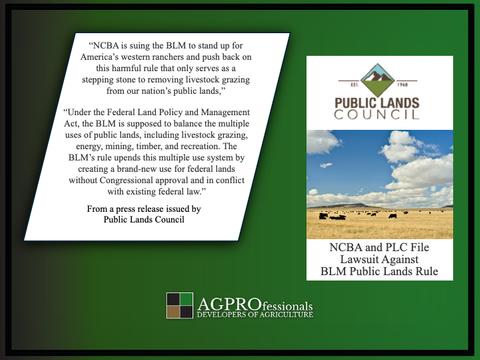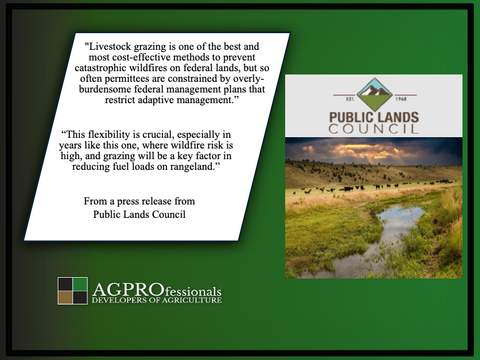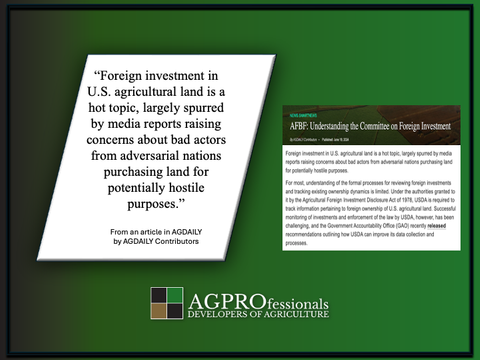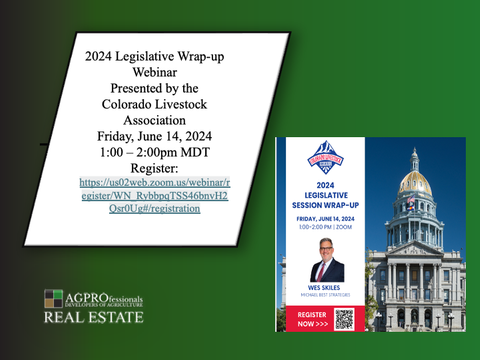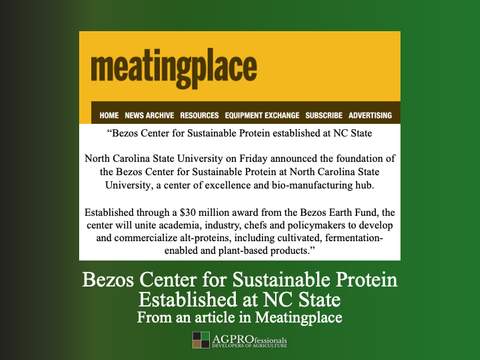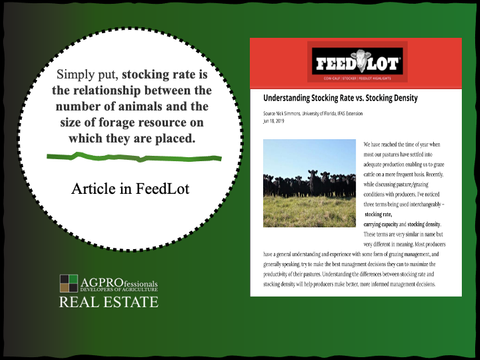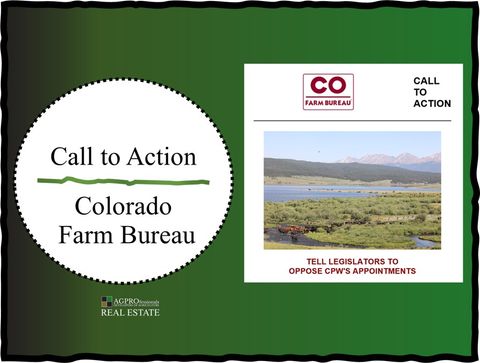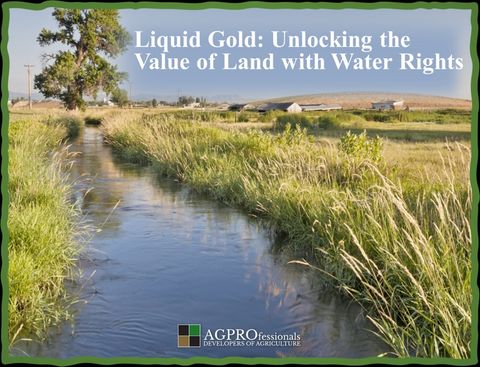Articles and Information
How the $15 Million Estate Tax Exemption Changes Your Farm Succession Strategy
From an article in AgWeb by Paul Neiffer
The world of estate planning for farmers has changed dramatically after the passage of the One Big Beautiful Bill Act. This permanently increased the lifetime gift and estate tax exemption to $15 million indexed starting Jan. 1. With the federal estate tax exemption at historically high levels, most family farms are no longer at risk of paying federal estate tax. However, this shift has brought a new focus to income tax planning and the importance of preserving the step-up in basis at death.
Understand the Step-Up in Basis
When a person passes away, the value of their property is generally reset to its fair market value at the date of death. This is known as a “step-up in basis.” For farm families, this is a crucial benefit. Farmland and other agricultural assets often appreciate significantly over time. If heirs inherit these assets, they receive them at the new, higher value. This means that if they later sell the property, they will owe little or no income tax on the appreciation that occurred during the original owner’s lifetime.
Why Estate Tax Is Less of a Concern
With the current high exemption, only the largest farm estates face federal estate tax. For most families, the bigger risk is not estate tax; it’s the potential for large income taxes if the step-up in basis is lost. This can happen if assets are given away during the owner’s lifetime, rather than being passed on at death.
moreAmerica’s Top 100 Landowners: The Totals Are Bigger And Consolidation Continues
From an article in AG Web by Margy Eckelkamp
The Land Report released its annual list of top 100 landowners in the U.S., and the popularity of land means the big keep getting bigger.
There is a new No. 1 biggest owner, Stan Kroenke, who surged to the top spot after acquiring the 937,000-acre Singleton ranch in New Mexico. He now owns more than 2.7 million acres.
Since its inception in 2007, The Land Report’s top spot has been held by someone with at least 2 million acres as Ted Turner was the first holder of the top title.
“2 million has always been the floor,” says Eric O’Keefe, editor of the Land Report.
O’Keefe says this report highlights the trend of landowners doubling down in this asset class.
“There is room at the top for additional acquisitions,” he says. “I don’t expect this to be the last from Kroenke Ranches. I don’t expect this to be the last from the Emersons or the Reeds or the other major timberland owners. I expect that the list will change and re-reorder in years to come.”
The top 100 landowners illustrate how more investment money is coming into land and bringing consolidation.
“It is a function of there’s more money out there than there is land available, and on the investor side of things they like the non-correlation with the stock market, and the positive correlation with inflation, and that’s what’s driving a lot of this interest in farmland,” says Steve Bruere, president of Peoples Company.
moreSummary of the changes to Colorado’s compost regulations
By Colorado Department of Health and Environment Environmental Protection Specialist Jace Driver.
In March of 2024, revisions were made to Colorado's compost regulations (Section 14 of the Solid Waste Regulations) with the primary intention of increasing the opportunities for food waste composting via increased allowable volumes at Conditionally Exempt Small Quantity facilities, and opening up food waste composting to certain Class I facilities. However, in addition to these changes, other revisions were made that added finished compost testing and storage requirements, as well as a new training requirement for some operations. These changes impact both new and existing facilities.
In order to facilitate compliance with these revisions, the following is a summary of the changes to the regulation, which types of facilities are affected by those changes, and the compliance requirements for each.
Section 14.6 (D) Finished Compost Testing
Facilities: All that distribute finished compost offsite (CESQ, Class I, II, and III)
Revision: All finished compost must now be tested for both biological indicators, fecal coliform and salmonella. Previously it was one or the other.
moreLandwatch Weekly
From an article in DTN Progressive Farmer by Katie Micik Dehlinger
Whole Milk is Back! Congress Passes Whole Milk for Healthy Kids Act
From an article in Dairy Herd Management by Taylor Leach
Congress has approved the Whole Milk for Healthy Kids Act, marking a major shift in federal school nutrition policy and reopening the door for whole and reduced-fat milk in school meal programs. The legislation reflects growing consensus around the nutritional value of milk at all fat levels and underscores the impact of sustained, bipartisan advocacy.
“Today we will restore students access to a wide variety of milk options assuring students have the necessary nutrients to learn and to grow, says Rep. Glenn Thompson, R-Pa., a leading supporter of the bill since its introduction. “I have worked for a decade to restore whole milk to our school cafeterias, which have been limiting healthy choices for students, but that changes today.”
He emphasized the importance of choice in school meals, noting that whole milk is a key part of a balanced diet for students.
“Whole milk is an essential building block for a well-rounded and balanced diet, and students should have the option to choose the milk they love. I am proud that my bill, the Whole Milk for Healthy Kids Act, passed the House today and now heads to President Trump’s desk for his signature,” Thompson added.
moreHow Trump’s Bridge Payments Could Affect Farmland Prices
How Trump’s Bridge Payments Could Affect Farmland Prices From an article in AgWeb by Margy Eckelkamp
Interesting article by AGWeb regarding Bridge Payments and the impact on the Ag Economy.
Farmers National Company president Paul Schadegg sees the recently announced $12 billion in bridge payments to farmers having a variety of effects on the ag economy.
“They think it’ll be a shot of adrenaline to the ag economy,” he says on “AgriTalk.” “There are some people who say they’ll use it to pay down debt or use for operating cash. Some need a new combine or tractor, and it might go toward that. And subsequently, it could add to the cash a buyer has in their pocket that they can deploy toward a land purchase, so it’s going to cover a broad spectrum.”
The bridge payment announcement coincides with the busiest time of year with higher volumes of land sales.
“It’s really active this time of year. We see a lot of land sales between October and March. We’re in the thick of it now,” Schadegg says. “The pipeline is full as we get into January and February for land sales.”
Steve Breuere from Peoples Company tells Paul Neiffer on the “Top Producer Podcast” about 40% of their land sales volume happens in the fourth quarter of the year.
Before the bridge payment announcement, Farmers National released their 2026 Farm Input Outlook. According to that report, input costs are projected to increase slightly compared to last year. Fertilizer prices are the biggest driver, most notably nitrogen. There will be modest increases in chemicals, financing costs, equipment and labor. Categories showing flat to small increases include seed, fuel and land.
moreConsumers Care More About Dairy’s Water Story
From an article in Dairy Herd Management by Taylor Leach
Dairy farmers are under the spotlight when it comes to water use, with consumers wanting more transparency than ever. For producers, managing this vital resource means balancing production needs with sustainability and regulatory expectations.
Tara Vander Dussen knows this all too well. The former environmental consultant and current co-host of the “Discover AG” podcast has spent much of her career helping farms navigate water regulations and sustainability challenges. She has also faced these pressures firsthand on her own dairy in New Mexico.
“Water is literally our limiting resource,” she says. “Conversations about the future of dairy revolve around how we access, use and conserve water.”
On an episode of “The Dairy Podcast Show,” Vander Dussen discussed why tracking and managing water is essential for dairies, noting that sharing these practices with consumers helps build trust.
Tracking and Cutting Water Use
Improving sustainability begins with understanding exactly how much water a dairy uses. Tracking provides a clearer picture of inefficiencies, helping farmers make smarter decisions.
“The first step [to improving water management] is knowing your numbers,” Vander Dussen says. “Through your farm’s permitting process, you can figure out how many gallons per cow per day you actually use. That baseline helps you see where water is going and where it might be wasted.”
moreConsumers Care More About Dairy’s Water Story
From an article in Dairy Herd Management by Taylor Leach
Dairy farmers are under the spotlight when it comes to water use, with consumers wanting more transparency than ever. For producers, managing this vital resource means balancing production needs with sustainability and regulatory expectations.
Tara Vander Dussen knows this all too well. The former environmental consultant and current co-host of the “Discover AG” podcast has spent much of her career helping farms navigate water regulations and sustainability challenges. She has also faced these pressures firsthand on her own dairy in New Mexico.
“Water is literally our limiting resource,” she says. “Conversations about the future of dairy revolve around how we access, use and conserve water.”
On an episode of “The Dairy Podcast Show,” Vander Dussen discussed why tracking and managing water is essential for dairies, noting that sharing these practices with consumers helps build trust.
Tracking and Cutting Water Use
Improving sustainability begins with understanding exactly how much water a dairy uses. Tracking provides a clearer picture of inefficiencies, helping farmers make smarter decisions.
“The first step [to improving water management] is knowing your numbers,” Vander Dussen says. “Through your farm’s permitting process, you can figure out how many gallons per cow per day you actually use. That baseline helps you see where water is going and where it might be wasted.”
moreLandwatch November 2025
From an article in Progressive Farmer by Katie Micik Dehlinger
Abuse of Liberty? Landowner Demands End to DNR’s Warrantless Entries on Private Acres
From an article in AgWeb by Chris Bennett
David Martin is raising hell in Michigan, determined to curtail the power claimed by government officials to enter private land without restrictions and surveil at will.
Martin, a landowner and 68th District representative in Michigan, hopes to end adherence to the Open Fields doctrine that gives conservation officers open access to private property.
“Open Fields is an abuse of liberty and we want it to stop in Michigan. It’s the 250th anniversary of the American Revolution and our forefathers would be disgusted to see how much government control the state has over private land. Enough.”
Co-sponsor of two bills blocking unfettered access for Department of Natural Resources (DNR) game wardens on private acreage, Martin’s legislative fight is echoed by pending Open Fields lawsuits around the U.S. in Alabama, Louisiana, Pennsylvania, and Virginia.
“At a basic level,” Martin emphasizes, “when people find out about Open Fields, they know it’s wrong.”
Without Reason
Open Fields ranks among the most consequential of all government powers. The doctrine stems from two Supreme Court decisions in 1924 (Hester) and 1984 (Oliver), giving federal officials permission to enter private land with no limits on frequency, duration, or scope. Essentially, the government can access any acreage without warrant or probable cause, excluding a personal residence and immediate yard/lawn/curtilage. Open Fields asserts that on private land, the Bill of Rights’ Fourth Amendment protections from search and seizure do not exist.
moreFlorida Cultivated Meat Ban Back in Court
From an article in MeatingPlace by Melissa Sue Sorrells
Lawyers from Institute for Justice representing cultivated poultry maker Upside Foods on Tuesday asked the 11th Circuit Court of Appeals to reverse a lower court’s decision and allow the challenge of Florida’s ban on cultivated meat products to proceed.
Instead, the three-judge appellate panel seemed to double down on the lower court’s decision, rejecting Upside’s claims.
Upside Foods sued the Florida Department of Agriculture and Consumer Services in 2023 after the state legislature passed SB1084, prohibiting the sale, manufacturing and distribution cultivated meat products.
The company has argued that the US Constitution’s Commerce Clause restricts the state from imposing limits on interstate trade. Only the federal government, the lawyers say, can regulate poultry products.
Lawyers for the state of Florida argued that Upside Foods has not been prosecuted under the law, and as such, does not have cause for an injunction against the ban.
A judge representing the Northern District of Florida in October 2024 denied the company’s request for a preliminary injunction to halt the enforcement of Florida’s ban. Upside appealed the decision.
The Northern District judge earlier this year dismissed most of UPSIDE Foods’ claims, granting only the Commerce Clause claim and allowing the case to move forward only on the argument that Florida’s law discriminates against out-of-state competition.
moreNew Animal Activism Reports Released: Activists Connect in the Courtroom
From an article in Dairy Herd Management by Abby Kornegay-Animal Agriculture Alliance
As part of the Animal Agriculture Alliance’s mission to safeguard the future of animal agriculture, we work to make sure that farm and food communities have all the facts about what animal activist groups are really working toward. That’s why we’ve recently released two new reports that break down the strategic coordination and funding behind these organizations.
The first report, “Radical Vegan Activism,” looks back at statistics from 2024 to show the tactics, targets and driving ideologies of key players within the movement. The numbers tell an important story, with nearly one-quarter of all documented activist attacks focusing on farms and food businesses. It is of note that research institutions were reported to be the most targeted overall. When it comes to agriculture, documented actions included vandalism (59 incidents), animal theft or release (43 cases) and trespassing (31 cases).
The second report, the “Major Animal Activist Groups Web,” outlines the connections between well-known organizations based on staffing, funding and project collaboration.
While some of these groups have a more public-facing presence — such as People for the Ethical Treatment of Animals (PETA) or Humane World for Animals (formerly Humane Society of the United States) — and often engage with the public and are seen on television commercials, others are working behind the scenes pushing legislation that is unfavorable to agriculture and, even in some cases, stealing animals from farms and facilities. The point of the “Major Animal Activist Groups Web” is to show that though groups may differ on how they get their point across, they are all working together in some ways to push for changes in modern animal agriculture that drive up the cost of production and threaten the availability of animal-sourced protein.
moreCorner-Crossing War Is Over: Supreme Court Refuses To Hear Landowner's Appeal
From an article in Cowboy State Daily by Clair McFarland
“The ability to ladder-vault a corner of private property to access landlocked public lands is now the rule across much of the American West, after the U.S. Supreme Court declined Monday to hear a Carbon County landowner’s challenge of the practice.
The case of four hunters who crossed Fred Eshelman’s land — technically held by Iron Bar Holdings LLC — in Carbon County to access a landlocked public parcel started four years ago when the hunters were cited for trespassing.
They won their criminal case at a trial.
When Eshelman’s company then sued the hunters for civil trespass, who won that case at every stage as well, culminating in the 10th Circuit Court of Appeals ruling in the hunters’ favor in March.
After deliberating Friday, the U.S. Supreme Court also sided with the hunters, creating a precedent for corner-crossing in the 10th Circuit, which includes Wyoming.
It also leaves intact other similar language out of the Eighth Circuit, and sympathetic language in the Ninth Circuit.
‘Mixed Feeling'
Though tremendous, the win is bittersweet for the hunters’ attorney, Ryan Semerad of Casper-based firm Fuller and Semerad LLC.
moreGPS data shift could affect field boundaries
from an article in Hoard's Dairyman by Jenna Byrne, Associate Editor
“An important change is coming to the frontlines of precision agriculture. In 2026, the U.S. National Geodetic Survey will launch a new reference system for global positioning system (GPS) data. The old standards like the North American Datum of 1983 (NAD 83) for horizontal positioning and the North American Vertical Datum of 1988 (NAVD 88) for elevation, will be replaced with the North American Terrestrial Reference Frame of 2022 (NATRF 2022) and the North American-Pacific Geopotential Datum of 2022 (NAPGD2022). While that may sound like a minor technical update, the change could move mapped field coordinates by several feet, said Iowa State University extension specialist Doug Houser in an Integrated Crop Management Blog.
These datums serve as the foundation for every GPS-based activity on the farm, including things like autosteer lines, yield maps, tile drainage, and field boundaries. The current system is slightly off from Earth’s true center, creating small errors that could have larger effects later down the road. The new datums will better align with global navigation satellites and improve accuracy nationwide.
Most farmers using the Wide Area Augmentation System (WAAS) or commercial Real Time Kinematics (RTK) correction services may not notice much difference. But those using local base stations or state Real-Time Networks (RTN) tied to NAD 83 could see their GPS points shift by 1 to 4 meters. “If you’re using the Iowa Real-Time Network continually operating reference stations (IARTN CORS), you’ll definitely want to plan ahead, as your reference positions will shift, and field alignments may no longer match,” he said. That means an autosteer line that ran perfectly straight this fall could suddenly cut across a field boundary after 2026.
moreTELLING THE STORY OF BEEF-ON-DAIRY CATTLE ACROSS THE SUPPLY CHAIN
LAURENCE WILLIAMS Beef-on-Dairy Development, Purina Animal Nutrition
Purina Animal Nutrition has created a report regarding the beef on dairy trend and its impact, titled, “Telling the Story of Beef on Dairy Cattle Across the Supply Chain. It was written by Laurance Williams, Beef on Dairy Development, Purina Animal Nutrition.
Report excerpts:
With an estimated 12-15% of the annual fed slaughter being beef-on-dairy, this group of cattle is becoming foundational in meeting consumer demand for premium beef. A year round supply of quality cattle offers an opportunity to deliver consistent beef demand among consumers. The opportnity exists to collaborate across the supply chain and improve an already important part of the fed slaughter.
Beef-on-dairy calves are proving their worth by consistently achieving quality traits, particularly in marbling. With native beef cattle numbers remaining low and demand for high-quality beef holding strong, there’s growing opportunity and a responsibility to raise these crossbreds with intent. That means beginning with the end in mind and using every tool available, from genetics to nutrition to on-farm management, to ensure they reach their full potential at harvest.
Purina Animal Nutrition became an early leader in the beef-on-dairy space because we saw the moment as both a challenge and an opportunity for producers and packers. This report is a commitment to sharing industry knowledge, connecting key players across the value chain and continuing to optimize animal performance through science-backed nutrition programs like PrimeStart™.
moreWho owns Iowa farmland? Too often, it’s not farmers
From an article in AGDaily by Erin Jordan, The Cedar Rapids Gazette
“Fewer than half the people at a recent farm auction in Clinton County were actual bidders. The rest came for the cookies, conversation and to see who would walk away with 150 acres of Iowa dirt.
Would it be the men in suits sitting in folding chairs by the wall?
What about the old-timer in overalls?
Or would an online buyer swoop in with the highest bid?
“Folks, you don’t want to be driving past the farm and saying ‘I wish I would have bought it’ later down the road,” said Jesse Meyer, an auctioneer for the Peoples Company. “It’ll be another 50, 60, 70 years before this farm comes back on the open market.“
The sense that Iowa’s agricultural land is both scarce and gaining in value has driven the average price to a record-setting $11,400 per acre last year. Now Iowa farmers are bidding not only against neighbors, but out-of-state investors including professional athletes, well-known billionaires, and the Mormon Church.
The Cedar Rapids Gazette spent four months searching county assessor records in all 99 counties, looking at maps and talking with land agents, farmers and investor owners to get a sense of who owns Iowa farmland. Here are some of our findings:
moreNegotiations Stall as Colorado River Crisis Looms Again
From an article in Morning AgClips by Caleb Hampton, California Farm Bureau
“Time is running out for the seven states in the Colorado River Basin, as well as 30 tribes and Mexico, to reach a long-term deal for managing the overtapped river.
The current guidelines and drought contingency plans for the river expire at the end of next year, and negotiators have until Nov. 11 to reach a new agreement or risk intervention by the federal government.
Meanwhile, after one of the river’s driest years on record, reservoir levels at Lake Mead and Lake Powell have again declined, prompting warnings from federal officials and hydrological experts.
“The urgency for the seven Colorado River Basin states to reach a consensus agreement has never been clearer,” Scott Cameron, acting assistant secretary for water and science at the U.S. Department of the Interior, said last month in a statement. “We cannot afford to delay.”
The Colorado River supplies water and hydropower to 40 million people in the West and irrigates more than 5 million acres of farmland. During the past two decades, unprecedented drought has depleted the river’s flow and threatened to sink reservoir levels below the threshold needed to supply water and electricity to the Lower Basin.
moreTriumph Foods Sues California on Prop 12
From an article in Progressive Farmer by Todd Neeley
"California's Proposition 12 unlawfully interferes with the federally regulated pork industry and unfairly discriminates against out-of-state pork producers and processors in violation of the U.S. Constitution, Triumph Foods LLC argues in a federal lawsuit filed on Tuesday.
The company based in St. Joseph, Missouri, becomes the first meat processor in the country to challenge Prop 12, but is using a legal approach that was successful in Triumph's lawsuit against a similar law in Massachusetts known as Question 3.
Although forbidden under the Federal Meat Inspection Act, Triumph argues in the lawsuit filed in the U.S. District Court for the Central District of California, that California provides an exemption from Prop 12 for federally inspected facilities to sell non-compliant pork in the state.
Prop 12 makes it a criminal offense and civil violation to sell whole pork meat in California unless the pig it comes from is born to a sow that was housed within 24 square feet of space and in conditions that allow a sow to turn around without touching an enclosure. Prop 12 applies to any uncooked pork sold in the state, regardless of whether it was raised in California.
moreCourt: Agricultural Drains May Operate Without Permit
From an article on Morning AgClips by Ching Lee
Court: Agricultural Drains May Operate Without Permit
Ruling has been described as a resounding legal victory for agriculture
In what has been described as a resounding legal victory for agriculture, a federal appeals court has ruled that irrigation return flows discharged to waters of the United States through agricultural drains remain exempt from federal permitting requirements.
The 9th U.S. Circuit Court of Appeals decided earlier this month that operation of a large-scale Central Valley agricultural drainage system does not require a permit under the federal Clean Water Act because the discharge is composed entirely of return flows from irrigated farmlands.
The three-judge panel upheld the dismissal of a lawsuit alleging that the U.S. Bureau of Reclamation and the San Luis & Delta Mendota Water Authority’s operation of the Grassland Bypass Project and the San Luis Drain violated the Clean Water Act.
At issue is whether the project, which comprises an extensive underground tile drainage system that takes in water used for crop irrigation, should be exempt from federal National Pollution Discharge Elimination System permitting requirements. The appeals court said yes.
moreUSDA to Hold Listening Sessions Addressing the Rural Veterinary Shortage
From an article in Dairy Herd Management by Andrea Bedford
Two sessions are planned for next week for the veterinary workforce. Register now to have input and help guide the Rural Veterinary Action Plan.
Last month, Secretary of Agriculture Brooke Rollins announced the Rural Veterinary Action Plan, which will enhance the support available for rural veterinarians across the US. The plan includes the following action items:
- Improve Veterinary Grant Programs
- Better Understand the Rural Veterinary Shortage
- Recruit and Retain Veterinarians
- Catalog Federal Resources Available to Veterinarians
- Work with Stakeholders to Understand the Barriers to Entry and Increase Recruitment in Rural Areas
This plan aims to address the rural veterinary shortage due to the low percentage of veterinary school students that come from rural areas or express an interest in rural practice, along with the low number of recent grads entering production animal medicine.
As a part of the working with stakeholders action item, USDA will be hosting two virtual listening sessions for the veterinary workforce on Sept. 29 and 30. The following USDA agencies will be represented at these sessions:
moreLowballed by Eminent Domain, ND Farmers Appeal Landmark Case to Supreme Court
From an article in AG Web by Chris Bennett
In a stunning assertion of power, the federal government is forcing landowners to pick between two poisons. Accept lowball eminent domain offers for private property or drown in legal costs. Damned if you do, damned if you don’t.
Leonard Hoffmann was offered roughly half the market rate for gas pipeline access across his pastureland, backed by the threat of eminent domain. He spent hundreds of thousands of dollars in court to contest the offer, but despite winning, Hoffmann received a financial hammer blow: pay all legal costs.
In a staggering ruling, the U.S. Court of Appeals for the Eighth Circuit declared Hoffmann must foot the bill to challenge below-market land offers—even though he won on the issue related to the use of other pipeline easement transactions as comparable sales. He proved his case that he is entitled to recover fees, but according to the Eighth Circuit, if a landowner dares to challenge a government-backed gas giant, the landowner loses either at the get-go or the finish line.
Hoffmann, along with several other neighboring property owners, is taking his case directly to the Supreme Court of the United States, represented by the Institute for Justice.
moreWisconsin Ag Regulators Propose Massive Livestock Fee Increases
From an article in Dairy Herd Management by Angie Stump Denton
The Wisconsin Department of Agriculture, Trade and Consumer Protection (DATCP) is proposing changes to rules, ATCP 10 and 12, regulating animal disease and movement and animal markets, dealers and truckers.
According to the Wisconsin Farm Bureau Federation (WFBF), these changes include massive fee increases that will be a substantial financial burden to markets, dealers and truckers that will unavoidably be passed down to farmers.
The license fee for what the DATCP calls “Animal Market Class A” would change from $420 to $7,430. A late fee for those markets would also increase by nearly 1,700% by shifting from the current price of $84 to $1,486. The registration fee paid by about 1,000 truckers transporting livestock in the state would increase 517%, from the current price of $60 to $370.
WFBF Government Relations Director Jason Mugnaini says it is important to clarify that Wisconsin’s program had historically received state funding support through DATCP, but this proposal shifts that onto industry fees.
moreWater: The Overlooked Nutrient in Dairy Farming
From an article in Dairy Herd Management by Karen Bohnert
Water is the most important nutrient in dairy farming, yet it often goes unnoticed. Vern Osborne, a professor emeritus from the University of Guelph, highlights its significance in a recent episode of “The Dairy Podcast Show.” Throughout the podcast, Osborne delves into the critical yet often overlooked role that water plays in dairy herd health and performance. He shares insights and advice from nutrient supplementation through water to improving water quality and facility design.
The Mega Molecule: Water’s Vital Function
Osborne affectionately refers to water as the “mega molecule,” emphasizing its fundamental role in every cell function within a cow’s body.
“Cows are incredibly sensitive to water quality, detecting elements at parts-per-million levels,” he says.
Transition cows, in particular, demonstrate a sharp increase in water intake. Osborne and his team explored supplementing water with nutrients such as glucose, soybean dextrose and omega fatty acids. Their research revealed water can carry vital nutrients to maintain cows in a positive energy status, affecting health and productivity favorably, even amid stressors like calving.
Practical Implementation and Facility Design
moreThe Roadless Rule Rescission: Agricultural Impacts & Real Estate Implications
The USDA’s June 2025 decision to rescind the 2001 Roadless Area Conservation Rule (Roadless Rule) marks a significant policy shift with direct consequences for agriculture and agricultural real estate. Those involved in livestock production and utilization of resources on public lands, and land investment, must focus on how these changes will shape access, value, and operational viability in rural America.
Agricultural Access
Access is critical for livestock producers and agricultural operations. Under the Roadless Rule, restrictions on road construction often limited the ability of ranchers to effectively manage cattle on federal allotments. Roads are more than paths through the forest; they are lifelines for transporting feed, hauling livestock, maintaining water infrastructure, and ensuring ranchers can reach grazing allotments. Improved access may also reduce costs associated with grazing on public land. This efficiency translates directly into higher profitability, making agricultural real estate tied to grazing rights more attractive to buyers and investors.
Grazing Allotments and Property Value
The value of ranchlands is often tied to access to federal grazing permits. When those permits are hampered by limited infrastructure, the real estate market discounts the property. Conversely, when access improves, so too does land value. The removal of the Roadless Rule reopens possibilities for infrastructure development, which could make federal grazing permits and the ranches they are attached to more valuable and operationally practical.
moreEPA Rejects Additional Wastewater Rules for Meat and Poultry Plants
From an article in MeatingPlace by Chris Moore
“EPA Administrator Lee Zeldin announced the decision at Christensen Farms in Minnesota, calling it part of the Trump Administration’s effort to reduce regulatory costs while maintaining environmental protections.
“EPA is saving billions of dollars in costs the American people would otherwise see in the prices of the meat and poultry they buy at the grocery store while ensuring the protection of human health and the environment,” Zeldin said.
The move was welcomed by agriculture and meat industry groups, who argued the proposed rule would have forced plant closures, raised food prices and threatened livestock markets. USDA Secretary Brooke Rollins called it a “commonsense approach that protects America’s meat and poultry processors and the farmers and ranchers they serve from unnecessary red tape.”
Industry leaders including the National Pork Producers Council, National Cattlemen’s Beef Association, National Chicken Council, U.S. Poultry & Egg Association, and National Turkey Federation issued statements praising the decision as critical to keeping small and mid-sized processors viable. The Meat Institute also said the action would preserve jobs and protect consumers from higher food prices.
moreUSDA Expands Efforts to Increase Large Animal Veterinarian Workforce and Protect America’s Food Supply
From an article by Western Ag Network
“U.S. Secretary of Agriculture Brooke L. Rollins has announced a commitment to new actions to increase the number of rural food animal veterinarians across the U.S. and recruit new veterinarians to join the U.S. Department of Agriculture (USDA) in their role to protect American ranchers, animals, and our food supply.
Secretary Rollins also announced two awardees of the Veterinary Services Grant Program which will allow for expanded capabilities to serve livestock producers in rural Mississippi and opened a new consolidated USDA office with the Rural Development, the Farm Service Agency, and the Mississippi Farm Bureau in line with USDA’s reorganization efforts. The Secretary was joined by Governor of Mississippi Tate Reeves, Senator Cindy Hyde-Smith of Mississippi, Mississippi State University (MSU) President Dr. Mark Keenum, and Mississippi Farm Bureau President Mike McCormick.
“Rural veterinarians are vital for the agricultural economy in the United States. Our farmers and ranchers rely on these critical services to prevent the transmission of animal disease, protect our food supply, and support America’s rural economy. As the number of rural food animal veterinarians continues to decline, USDA is putting Farmers First to ensure we build back our first line of defense in our animal food production system – the rural veterinarian. With these new investments in scholarships and pay incentives, USDA is not only strengthening our animal food production system but also listening to producers and veterinarians across the country to ensure our programs meet real-world needs. Together, we will keep America’s food supply strong, safe, and secure,” said Secretary Brooke Rollins.
moreNew World Screwworm symposium September 24-25, 2025
From the United States Animal Health Association (USAHA), in partnership with National Institute for Animal Agriculture:
“Save the date for September 24-25 to address the growing threat of the New World Screwworm (NWS) to U.S. livestock.
The United States Animal Health Association (USAHA) will host a timely and critical New World Screwworm symposium September 24-25, 2025 to address the growing threat of the New World Screwworm (NWS) to U.S. animal populations. USAHA is pleased to collaborate with The National Institute for Animal Agriculture (NIAA) to provide a solutions-based effort to help inform stakeholders on preparedness and mitigation should it reach the U.S.
NWS is a destructive pest whose larvae infest living tissue, causing severe harm or death in livestock, pets, wildlife, and, in rare cases, humans. With increased global movement and ecological shifts of NWS northward, the risk of NWS re-entering the U.S. has become an urgent concern.
This event will foster collaboration across veterinary, livestock production, and wildlife management communities. Attendees will gain insights into current research, prevention strategies, and treatment protocols, and participate in cross-sector discussions aimed at strengthening outbreak preparedness. Together, we will advance a unified approach to mitigating the serious threat of NWS.
moreProposed WOTUS Rule Expected Soon
American Farm Bureau Federation
Notice from the American Farm Bureau Association:
“Farmers and ranchers are committed to protecting clean water. But commonsense efforts to protect the environment are made harder when federal rules are confusing or overreaching. That’s why the Waters of the U.S. (WOTUS) rule has remained a top concern for farmers and ranchers nationwide.
The definition of WOTUS has bounced back and forth between administrations for over a decade, creating uncertainty and risk for landowners. In 2023, the EPA and U.S. Army Corps of Engineers finalized a WOTUS rule that reintroduced a vague and unworkable standard, one that was later rejected by the Supreme Court in Sackett v. EPA. That ruling was a major win for agriculture, establishing clear limits on federal overreach and eliminating the “significant nexus” test. However, the updated rule that followed still leaves in place broad, unclear standards that continue to create confusion and concern.
What’s happening: We expect EPA to release a new proposed rule on WOTUS very soon. Once that happens, there will likely be only a 30-day public comment period. That’s a short window for farmers and ranchers to make their voices heard and it’s critical that they do. We’ll be sending an Action Alert as soon as the comment period opens.
moreEleven states back ranchers in beef labeling lawsuit
From an article in MeatingPlace by Chris Moore
A coalition of 11 state attorneys general filed an amicus brief supporting cattle ranchers in a lawsuit accusing major beef processors of misusing the “Product of USA” label on foreign-sourced beef.
The case, brought by South Dakota ranchers against JBS Foods, Tyson Foods, Cargill Meat Solutions and National Beef Packing Company, claims the companies wrongly labeled imported beef as domestic.
The U.S. District Court of South Dakota sided with the ranchers, but the ruling is now under review by the 8th U.S. Circuit Court of Appeals. In their brief, the attorneys general argued the Department of Agriculture has acknowledged that applying the label to foreign beef conflicts with federal requirements, and they urged the court to order the companies to stop the practice.
The coalition includes Colorado, Kansas, Idaho, Montana, Nebraska, New Mexico, North Dakota, Oklahoma, South Dakota, Texas and Wyoming.
moreYour classroom can adopt a moo-velous friend for SY ’25-26
From an article in AgDaily by its Reporters
Dairy Farmers of Wisconsin and Discover Dairy are inviting educators to register for the popular Adopt a Cow program, now open for the 2025-26 school year. This udderly delightful, and completely free, experience connects students with a real Wisconsin calf and her farm family, turning agriculture education into an unforgettable adventure.
“Adopt-A-Cow provides an engaging way to connect elementary school students to agriculture and learn about their farmer next door,” said Erika Schade, DFW’s School & Community Programs Manager. “Last year, we reached 55,000 students in over 1,500 classrooms, helping them gain a better understanding of how dairy products reach their tables.”
Each participating Wisconsin classroom is matched with a calf and receives regular photo and video updates, farm stories and educational materials throughout the school year. Students learn about the calf’s food, environment and daily care, while gaining insight into the farmers who care for her. Supplemental lessons and hands-on activities keep students engaged year-round and help connect the experience to subjects like science, math and reading. Many lessons align with Common Core standards.
more‘Rural Reckoning’ Finally Gives Voice to Colorado’s Dirty Big Secret
By Weld County Commissioner Scott K James
Weld County is our headquarters and it is where AGPROfessionals got its start. County Commissioner James is not alone in his views.
"As a Weld County Commissioner, I’m echoing the Rural Reckoning series—rural Colorado is fed up with being sidelined, and it’s time the Capitol listened.
When Colorado Politics and The Denver Gazette launched their “Rural Reckoning” series, it felt like someone finally stepped out of the Denver-Boulder bubble, looked east of I-25, and said, “Wait, there’s life out there?” Vince Bzdek’s most recent editorial doesn’t flinch from the obvious: the gap between Colorado’s rural roots and its urban crown is starting to look less like a crack and more like the San Andreas Fault.
To his credit, and this isn’t just lip service, Vince approaches the subject with something most statewide media outlets lost years ago: curiosity laced with humility. He doesn’t pretend there’s a single villain or one easy fix. Instead, he gives space to the cultural, economic, and political frustrations simmering on both sides of the divide.
moreIowa Family Fights County Over Loss of Farmland, Rejects Reclassification
From an article in AgWeb by Chris Bennett
Richard Fee’s Iowa farmland, in row crops since the late 1800s, has disappeared. His federal farm number is token, according to county regulators.
“Using the letter of the law, they basically declared I have no farmland,” he insists. “They’ve come for my ground in the name of reclassification, and the end result is that my taxes will more than double.”
From a past of corn, soybeans, and livestock to a present of CRP and pasture, Fee’s acreage is no longer deemed agricultural, per county assessment.
“I’ve taken land stewardship seriously and farmed my land in every way I could to make a dollar since the day I bought it,” he says. “This is unjust and I’m so tired of the government or anyone else that tries to take or inflict undue financial burden that costs people what they’ve worked hard for their entire life.”
Upside Down
In extreme east Iowa’s Scott County, Fee, recently retired out of construction, lives on gravel, alongside his wife, Katherine, who works at a veteran’s hospital in Iowa City.
“Our dream was to buy a farm, work the land, build a house, and mind our own business,” he says. “We did that in 2002, and bought our present 50-acre farm, which had been in row crop and livestock production of different types since the days when the prairie was first busted.”
moreLandwatch July 2025
compiled by DTN Progressive Farmer Magazine.
USDA: Land Values Up 4.3% in 2025
From an article in Progressive Farmer by Chris Clayton
“The value of all agricultural real estate continues to increase, rising an average of 4.3% this year to $4,350 per acre, USDA reported Friday.
The average cropland value nationally reached $5,830 an acre, up 4.7% from 2024.
The average value of pasture was $1,920 an acre, up 4.9% from a year ago.
USDA on Friday released its annual Land Values Summary report. The average value includes the value of both the land and buildings on farms.
To compile the Land Values Summary, USDA used a sample of 28,475 operations. All agricultural producers in the sample were contacted and recorded land value information for all the cropland and pasture they operate. Information was also collected on the value of buildings for a producer's operation. National Agricultural Statistics Service (NASS) field offices then conducted an analysis of the information and estimated land values, and their assessments were sent to the Agricultural Statistics Board (ASB) for independent review. Regional and national estimates were weighted by the amount of cropland and pasture in each state, based on the most recent Census of Agriculture, NASS explained in the report.
Every state reported increases in overall farmland land value. Michigan had the highest increase in land value at 7.8%; Tennessee at 7.7%; South Dakota at 6.8%; and Ohio, Texas and Utah each at 6.1%.
moreWhy Aren’t High Beef Prices Causing Sticker Shock With Consumers
From an article in Dairy Herd Management by Michelle Rook and Angie Stump Denton
Why Aren’t High Beef Prices Causing Sticker Shock With Consumers
From an article in Dairy Herd Management by Michelle Rook and Angie Stump Denton
Gound beef prices across the U.S. continue to reach new highs. Retail prices for ground beef hit its highest level in history in June climbing above $6 per pound, while steaks were up 8% at $11.49 per pound.
“The record high retail beef price reported by the most recent Consumer Price Index (CPI) has prompted a lot of calls about why prices are record high and whether there is any relief in sight,” says David Anderson, Texas A&M Extension economist for livestock and food product marketing. “While we often write about the great cattle prices for producers who are selling, there is a flip side, and that is consumers who are buying beef.”
Anderson explains reduced slaughter and beef production, especially in the second quarter of the year, cut supplies just as grilling season heated up for seasonal beef demand. The combination led to a spike in wholesale prices and retail beef prices.
Don Close, Terrain senior animal protein analyst, says: “What we have seen so far is consumers have been incredibly loyal to protein collectively, but they have been especially loyal to beef, and beef is actually continuing to gain market there, even at the current prices at the expense of the other protein.”
moreUSDA Offers New World Screwworm Webinar for Animal Industry Stakeholders
USDA Webinar: Understanding and Responding to New World Screwworm (NWS) Infestations
Date: August 13, 2025
Time: 1:00–2:30 p.m. ET
Hosted by: United States Department of Agriculture (USDA)
Join the USDA for an informative webinar focused on the biology, detection, and response strategies related to New World Screwworm (NWS)—a serious threat to livestock health and U.S. agriculture.
Learning Objectives
By the end of this webinar, participants will be able to:
• Explain the NWS life cycle, clinical signs, and impact on animal health
• Summarize the current outbreak status of NWS in Central America
• Understand how and where to report suspected infestations
• Identify key eradication and control measures
• Access available USDA support and outreach resources
Agenda (Eastern Time)
1:00 p.m. – Welcome & Introductions
Presenter: Stacey Williams
1:15 p.m. – Featured Presentation
Presenters: Dr. Cody Egnor & Dr. Joanna Davis
moreLand Values ‘Remarkably Stable’ Across the Country
From an article in AgWeb by Margy Eckelkamp
Article excerpts:
“Halfway through 2025, land values remain stable across the country despite reverberating uncertainty in the agricultural outlook. And while zooming out to a national level values appear stable, there are some geographic areas showing decline in values.
“The USDA forecasts 2025 net farm income to be the lowest since 2020. This will likely influence producer purchasing power and investor returns, especially as input costs, commodity prices, and interest rates fluctuate,” says Paul Schadegg, senior vice president of real estate for Farmers National Company. “While balance sheets generally remain strong, any negative movements in the ag economy could quickly impact the land market.”
Ty Kreitman of the Kansas City Federal Reserve District reports that from its survey of ag lenders across its district, the average value of non-irrigated farmland declined about 2% from a year ago in the first quarter of 2025.
Commenting on demand, a majority of farmland buyers are farmers, and as such, Schadegg says farmer profitability will be the driver of future farmland value trends.
Regarding supply, the overall market has listings down 25% from the peak inventories in 2020-2021. FNC marketed more than $450 in land in the first six months of 2025. And Schadegg notes an observation that many farm landowners are choosing the stability of the investment in the land’s appreciation rather than selling the property.
moreNebraska Says Colorado Broke Compact
From an article in Progressive farmer by Todd Neeley
Article excerpts:
“The state of Colorado is threatening Nebraska's water supply from the South Platte River by making illegal water diversions and is obstructing Nebraska's efforts to build the Perkins County Canal, the state of Nebraska alleges in a lawsuit filed with the U.S. Supreme Court on Wednesday.
The Supreme Court has jurisdiction in disputes between states and Nebraska said in its complaint the court's intervention is needed to stop Colorado from violating the South Platte River Compact that has been in effect since 1923.
The Perkins County Canal project goes back to a drought in the 1890s when desperate western Nebraska farm families started digging out a canal from the South Platte River in Colorado with plans to irrigate their crops.
The canal needed to go about 65 miles, but the project was scrapped in 1895 after about 16 miles were dug out, according to a historical article on the project in the North Platte Telegraph. In 1923, though, Nebraska leaders made sure to insert a clause in their water compact with Colorado to keep open the option for a canal.
According to information from Nebraska Attorney General Mike Pilger's office, the two states have been negotiating the details of the canal for "many years" but Colorado officials have yet to agree on "basic things" including location and size of the canal or how much water flows through it.
moreBuild Your Own Equestrian Dream
AGPROfessionals
Build Your Own Equestrian Dream with AGPROfessionals
Experienced in Livestock & Equestrian Operations
Are you planning on building your own custom home and horse facility? Whether you’re envisioning a serene private barn or a full-fledged equestrian center, AGPROfessionals and AGPROfessionals Real Estate offer a one-stop solution. We can assist every step of the way from land acquisition to facility design, permitting, and beyond. Our team is deeply rooted in agricultural and equine markets. We have decades of hands-on expertise, from involvement in horse associations to running boarding stables, breeding and showing horses, and operating large ranching operations to designing large-scale livestock facilities. Our team understands your needs, and we have the expertise to make your vision a reality.
We Can Help You Find Your Ideal Property
We represent a variety of different types of listings from raw land to turn-key facilities, scattered across Colorado and neighboring states. Currently in Northern Colorado, we have a robust inventory of 7 to 40+/- acre tracts ideally suited for custom development for horse enthusiasts with convenient locations and no restrictions.
moreOne Big Beautiful Bill Passes, What Does It Mean for Dairy Farmers?
From an article in Dairy Herd Management by Sarah Jungman
Article excerpts:
“After passing the “One Big Beautiful Bill act” (OBBB) last Thursday, the American dairy farmer has new legislation to hopefully help aid prices, offer tax relief and boost current insurance programs. Now that the dust has settled and the ink has dried, here is a closer look at what will affect the average dairy producer going forward.
The OBBB first and foremost extended the Dairy Margin Coverage (DMC) through 2031. This will ensure that producers have no gap in the insurance coverage that helps support income through the RMA. There are a few key changes made to make it a little more attractive to the producer such as changing the Tier 1 coverage limit from 5 million to 6 million pounds of milk per farm. As production per cow increases and farm sizes grow, this 20% increase was seen as necessary to support the farms that feed us. Another important change is farms can now use the highest production year from 2021-2023 as their baseline. There is also a 25% discount for producers to commit on multiple year enrollment on their premiums.
In an effort to ensure transparency for Class III and IV milk, both the House and Senate agreed that requiring a biennial USDA cost survey of dairy processors should be mandatory. The goal is to better align make-allowance estimates with timely real costs of producing cheese, butter and nonfat dry milk so the processor has less marketing power and help ensure the long-term pricing fairness.
moreNew World Screwworm: The Billion Dollar Battle at the Southern Border
From an article in Dairy Herd Management by Maggie Malson
“Nearly 60 years ago, the U.S. eradicated New World screwworm (NWS). Today, the risk of reintroduction is real. So real that Ethan Lane with the National Cattlemen’s Beef Association (NCBA) says it’s not a matter of if NWS will reach the U.S. but when.
“We need to spend $300 million now to save us $8 billion down the line in eradication costs,” says Lane, who serves as the senior vice president of government affairs. “This is a marathon, not a sprint, and it’s going to take years to re-eradicate New World Screwworm and push it back to Panama.”
As the fight to keep NWS out of the U.S. ramps up, the economic impact on ranchers and the industry is top of mind.
“Successfully eradicating New World screwworm from the U.S. in 1966 cost stakeholders’ tens of millions of dollars,” says TR Lansford III, DVM, deputy executive director and assistant state veterinarian with the Texas Animal Health Commission. “The freedom from NWS provides an estimated $1 billion in direct benefits to livestock producers and $3.7 billion in benefits to the general economy annually.”
Financial Impact of NWS On Ranchers
Regular, large-scale outbreaks of NWS started occurring in the U.S. in the 1930s. According to APHIS, producer losses have reached:
moreUSDA Secretary Targets Chinese Ag Ties
From an article in Progressive Farmer by Chris Clayton
Trump Administration Unveils Plan to Ban Chinese Ownership of US Farmland and Ag
Article excerpts:
“The Trump administration is pushing to ban new Chinese ownership of American farmland and increase scrutiny of Chinese ownership of major agribusinesses such as Smithfield Foods and Syngenta.
Agriculture Secretary Brooke Rollins led a team of other Cabinet officials, Republican governors and members of Congress at USDA's headquarters in Washington, D.C., on Tuesday to announce a new "National Farm Security Action Plan" that will target China and other foreign adversaries. Rollins said the effort will "address one of the most significant national security threats facing our nation."
Rollins said U.S. agriculture is facing a threat from increased foreign ownership of U.S. food production. Farms, she said, "are weapons that can be turned against us."
"Every family, every home, every community depends on what our farmers do, and they support and sustain us, not merely by keeping us materially fed, but by keeping us spiritually strong," Rollins said. "The farms' produce is not just a commodity, it is a way of life that underpins America itself, and that's exactly why it is under threat from criminals, from political adversaries and from hostile regimes that understand our way of life as a profound and existential threat to themselves."
moreSecretary Rollins Rescinds Roadless Rule, Eliminating Impediment to Responsible Forest Management
From a USDA Press Release
"Today, U.S. Secretary of Agriculture Brooke L. Rollins announced during a meeting of the Western Governors’ Association in New Mexico, the U.S. Department of Agriculture (USDA) is rescinding the 2001 Roadless Rule. This outdated administrative rule contradicts the will of Congress and goes against the mandate of the USDA Forest Service to sustain the health, diversity, and productivity of the nation's forests and grasslands. Rescinding this rule will remove prohibitions on road construction, reconstruction, and timber harvest on nearly 59 million acres of the National Forest System, allowing for fire prevention and responsible timber production.
This rule is overly restrictive and poses real harm to millions of acres of our national forests. In total, 30% of National Forest System lands are impacted by this rule. For example, nearly 60% of forest service land in Utah is restricted from road development and is unable to be properly managed for fire risk. In Montana, it is 58%, and in Alaska’s Tongass National Forest, the largest in the country, 92% is impacted. This also hurts jobs and economic development across rural America. Utah alone estimates the roadless rule alone creates a 25% decrease in economic development in the forestry sector.
moreIn Today’s Ag Economy, What’s Supporting Land Values?
From an article in Farm Journal AgWeb by Margy Eckelkamp
“When looking at the data from 2024 and 2025 so far, Doug Hensley, president of Hertz Farm Management, says keeping perspective is important.
“Coming out of the 2020 through 2023 growing seasons, agriculture in general was probably in its strongest financial footing that it has ever been in, or at least in the last 50 years,” Hensley says.
He says 2024’s farmer income was kept afloat by the ECAP payments along with stronger markets in January and February in the early months of this year.
“A lot of people had a little bit of profit and are fighting to see another day, and out in the countryside right now, it’s not a perfect crop everywhere, but holy buckets, I mean it’s going to be a big crop, if we finish this thing,” Hensley says.
Hensley will be watching crop conditions through pollination — particularly in the next three weeks.
Hensley says this past fall, land values dipped with lower commodity prices, higher interest rates, and higher input prices challenging profitability.
“With the early ‘25 rallying commodity prices and the ECAP payments really supporting cash flow out in the countryside, we actually saw a little bump in the land market this spring,” he says. “This I would attribute to the fact that very few farms have sold.”
moreThe Value of Agricultural Real Estate Experts in a Changing Landscape
AGPROfessionals Real Estate
The Value of Agricultural Real Estate Experts in a Changing Landscape
At AGPROfessionals Real Estate, we understand that farmland is far more than acreage; it’s a legacy, a livelihood, and an investment in the future. Navigating agricultural property transactions requires more than just basic real estate knowledge; it demands a deep understanding of land use, market conditions, regulatory hurdles, and the long-term viability of farming operations.
That’s why AGPROfessionals offers one of the most comprehensive agricultural consulting services in the nation. We are proud to be among the few firms that provide end-to-end support for ag enterprises, from real estate brokerage to planning, engineering, permitting, and development. Whether you are buying your first section of irrigated ground, selling a long-held family operation, or expanding into new territory, we have the expertise to guide every step.
What Sets AGPROfessionals Real Estate Apart
Our agricultural real estate specialists do more than facilitate transactions; they help shape the future of agriculture. Every client benefits from our team’s deep industry insight, boots-on-the-ground experience, and access to a nationwide network of buyers, sellers, and agricultural stakeholders.
moreBlack Vulture Relief Act of 2025: Critical Support for Livestock Owners
AGPROfessionals Real Estate
Black Vulture Relief Act of 2025: Critical Support for Livestock Owners
U.S. Senator Markwayne Mullin (R-OK) has introduced the Black Vulture Relief Act of 2025, a significant move to support America’s agricultural producers. The bill is designed to ease the growing burden of black vulture predation on livestock. Co-sponsored by Senators Tommy Tuberville (R-AL), Eric Schmitt (R-MO), and John Cornyn (R-TX), the legislation aims to give ranchers and farmers the tools they need to protect their herds from these increasingly aggressive predators.
Predators, Not Scavengers
Unlike other vultures known primarily for cleaning up carcasses, Black Vultures pose a serious threat to living animals. These birds are aggressive, coordinated hunters that often strike in large groups. Their primary targets include newborn calves, lambs, goat kids, and piglets, with attacks frequently occurring during or immediately after birth—when mother animals are especially vulnerable.
The U.S. Department of Agriculture’s Wildlife Services has reported a nearly 25% increase in black vulture attacks on cattle between 2020 and 2025. In fact, Black Vultures were the third leading cause of calf deaths due to predation in 2015, responsible for 24,600 deaths—roughly 10% of total predator-related calf losses.
moreUSDA invests $21 million in screwworm sterile fly production By AGDAILY Reporters
By AGDAILY Reporters
Article excerpts:
“The U.S. Department of Agriculture is ramping up efforts to control the New World Screwworm with a $21 million investment in a new sterile insect production facility in Metapa, Mexico. The announcement came during a bilateral call between U.S. Agriculture Secretary Brooke Rollins and her Mexican counterpart, Secretary Julio Berdegué Sacristán, as both nations reaffirmed their commitment to containing the spread of the destructive livestock pest.
The New World Screwworm, a parasitic insect that preys on warm-blooded animals, poses a significant threat to livestock health, rural economies, and national food security. It was eradicated in the U.S. in the 1980s through a coordinated regional campaign, but persistent threats in parts of Mexico and Central America continue to pressure the U.S. border.
“Our partnership with Mexico is crucial in making this effort a success,” Rollins said. “We are continuing to work closely with Mexico to push NWS away from the United States and out of Mexico. The investment I am announcing today is one of many efforts my team is making around the clock to protect our animals, our farm economy, and the security of our nation’s food supply.”
moreNebraska brand bill amended again; more changes possible
From an article in Tri-State Livestock News by Carrie Stadheim
Article excerpts:
“The Nebraska legislature amended the feedlot brand bill again on May 21, 2025, and this might not be the final change.
Although it was rumored that the contentious bill might not be brought up again with the legislative session nearing the end, it was in fact scheduled for floor debate May 21, 2025. A new, unexpected amendment was offered that day and passed by a voice vote.
After multiple amendments and conversations about optional language, the Nebraska unicameral approved AM 1558 which essentially makes three changes to the current Nebraska brand law.
- Lowers the fees for Registered Feedlots (RFLs) from the current fee of $1 per head calculated on one-time capacity to $.50 per head based on one-time capacity
- Raises the cap for the brand inspection fee to $1.50.
- Exempts qualified dairies from brand inspection
Ibach told TSLN that she might propose yet another amendment. She would like to see an exemption for cattle that enter a growyard or feedyard but do not change ownership. Currently when cattle enter a growyard or a feedyard they must be inspected even if no change of ownership occurs. Ibach would like to see this amended to require no more than one inspection, and for cattle that come into the inspection area from a non-inspection area (such as cattle entering the Nebraska inspection area from Kansas), health paperwork or other paperwork should be sufficient to supplant the current required inspection, she believes.
moreRollins’ first major policy proposal aims to boost smaller farmers
From an article by AGDAILY reporters
Rollins’ first major policy proposal aims to boost smaller farmers
From an article by AGDAILY reporters
Article excerpts:
“Agriculture Secretary Brooke Rollins’ first major set of policy proposals are aimed at improving the viability and longevity of smaller-scale family farms — a tactic directly addressing some of her biggest critics over the past several months. The newly launched Make Agriculture Great Again Initiative has outlined a toolkit of actions, including the streamlining of application processes, improving reliable access to credit, farmland, and markets, and appropriate business planning tools that are intended to better serve the 86 percent of farms in the U.S. that are considered to be small operations.”
“Her 14-page Farmers First proposal is broken down into 10 categories that will “ensure small family farmers can start and stay in business for generations to come,” the document said. “USDA is placing specific emphasis on understanding the barriers to starting and keeping small family farms viable.” The categories are:
morePerspective: A farmer’s legacy shouldn’t be a tax nightmare for their kin
From an article in AGDAILY by Amanda Zaluckyi
Benjamin Franklin famously said, “In this world, nothing is certain except death and taxes.” The Founding Father didn’t know it then, but sometimes those two constants happen in quick succession.
For farm families, estate taxes aren’t just an abstract policy debate — they’re a very real threat to generational farms and the livelihoods they support. While tax policy tends to fly under the radar for most people, recent developments out of Washington, D.C., are once again putting the federal estate tax front and center, especially for the agricultural community.
This time the story starts with the 2017 Tax Cuts and Jobs Act (TCJA), which dramatically increased the federal estate and gift tax exemption. That exemption — essentially the amount of wealth a person can pass on without triggering the federal estate tax — was doubled under the TCJA. For 2024, that amount sits at $13.61 million per person, or $27.22 million for a married couple. But, as with many things in tax law, it came with an expiration date. When the calendar flips to January 1, 2026, the exemption will drop back down to its pre-TCJA levels, adjusted for inflation. That means a single person could pass on only roughly $7 million before the estate tax bill comes due.
moreMaude Case: Frequently Asked Questions
From an article in Tri-State Livestock News by Heather Hamilton Maude
On June 24, 2024, the United States Forest Service (USFS) chose to criminally indict my husband and I, instead of seeking resolution to a boundary issue they first made us aware of on March 29, 2024. On April 30, 2025, our family stood on the steps of the USDA building in Washington D.C. as Secretary of Agriculture Brooke Rollings announced that the criminal charges brought against us were dropped.
Much has happened since March of 2024, and we thank Tri-State Livestock News (TSLN) for working hard to share our story over the last year, during which time we could not speak to the press. Our inability to speak in combination with the unheard-of actions taken against us, and a piece of property and situation that is difficult to explain resulted in a lot of questions. With the dropping of the criminal charges, I can now speak, and TSLN has offered me this space to answer frequently asked questions by their readership, and others.
This issue occurred on the Cheyenne River in very eastern Custer County, South Dakota. An alleged hunter turned in a, “No Trespassing,” sign on a section of fence not on the boundary line. This was on the west boundary between our private property and USFS allotment. (We still have not seen that original complaint, and question its existence).
moreColorado Livestock Association presents its Q2 Safety trainingThursday,
Colorado Livestock Association presents its Q2 Safety trainingThursday, May 22, 2025 (8:30 AM - 10:30 AM) (MDT)
Join us for CLA's second quarter Safety Group Training at the Flood & Peterson offices in Greeley. The livestock producer safety training seminar will include agriculture safety presentations.
This training is worth 2 Safety Training Credits for CLA Safety Group Participants. Please register in advance.
Register Here: https://members.coloradolivestock.org/ap/Events/Register/wZF4gVRueCxCw
Agenda
8:30 AM Family and Farm Preparedness Planning
Dan Frazen, Colorado Department of Agriculture
Ian Frazier, Colorado Department of Agriculture Safety Intern
CDA will discuss the importance of planning for disasters of all sizes, introduce the All-Hazards Preparedness for Rural Communities guidebook, and then provide details on how to build comprehensive written Farm and Livestock Emergency Preparedness Plans.
9:15 AM Responding to First Aid Emergencies on Agricultural Operations
Noah Dennison, Nationally Registered Paramedic
moreUpcoming Colorado Department of Agriculture Stakeholder Meeting on Brand Inspection Fee Increases
AGPROFessionals Real Estate
Upcoming Colorado Department of Agriculture Stakeholder Meeting on Brand Inspection Fee Increases
At AGPROfessionals Real Estate, we know that issues impacting livestock producers also affect the value, operation, and future planning of agricultural properties. That’s why we want to make sure our clients and industry partners are aware of an important stakeholder meeting hosted by the Colorado Department of Agriculture (CDA) regarding proposed increases to brand inspection fees and assessments.
Meeting Details:
- Topic: Proposed fee and assessment increases for brand inspections
- Host: Colorado Department of Agriculture – Brands Division
- Date & Time: Tuesday, May 27th at 11:00 AM (MT)
- Location: Online via Zoom
- Zoom Registration: Register Here
- Submit Written Comments: Submit Feedback
Win for Livestock Industry CDPHE Upholds CAFO General Permit and Continues to Safeguard Colorado’s Natural Resources
From an article by Colorado Livestock Association
Livestock industry, led by the Colorado Livestock Association, prevails in a battle challenging the General CAFO Permit
Aurora, CO – “This week, the Executive Director of the Colorado Department of Public Health and Environment accepted the Colorado Livestock Association’s appeal and reversed the initial decision by the Administrative Law Judge reaffirming the validity of the General Permit for Concentrated Animal Feeding Operations (CAFOs). This decision was the right result for livestock raising families in Colorado and preserves a permitting system that protects our state’s natural resources while maintaining economic viability for Colorado’s agriculture industry for generations to come. Colorado’s General Permitting system sets one of the highest standards across the nation in environmental stewardship and protection.
In June 2022, the Center for Biological Diversity, Food & Water Watch, and the University of Denver Sturm Law Clinic challenged the statewide general water pollution permit for CAFOs. Based on the petitioners’ assertions the administrative law judge issued an opinion stating the need for additional liners and groundwater testing wells. The basis for the petition was a court decision vacating EPA’s CAFO permit program in Idaho due to inadequate monitoring.
moreHow to Win a Boundary Dispute Case
From an article in xyHt digital magazine by Jeff Lucas
Legal Boundaries
There are many players in a boundary dispute case, the judge, perhaps a jury, the parties, the attorneys, and maybe some witnesses. When a surveyor is hired as an expert in such a case, it is not the surveyor’s responsibility to win a boundary dispute case, but the surveyor can play a significant part towards that end.
Even if not hired as an expert, a surveyor could also be called upon to defend a boundary determination previously made. Therefore, it is incumbent upon the practitioner to make every boundary determination as if going to court and defending that decision. With this assumption in mind, let’s look at a few things the prudent practitioner might want to consider.
To begin with, you need to assume there will be a competing survey performed by a competing surveyor if you go to court. This means that one surveyor is going to be a winner and the other will be a loser. If it’s not already obvious, you want to be the winner. Losing the case can have other negative repercussions.
If you are the only surveyor in court this is not necessarily a positive sign. It could mean one of two things: the other side can’t afford a surveyor or they think your survey is so bad they don’t need a surveyor. There are many example cases where there was only one surveyor in court and the client still lost the case–the primary reason being the surveyor didn’t make a boundary determination that could win in court.
moreColorado Wildlife and Biodiversity Protection Act - A Proposed Ballot Initiative
AGPROfessionals Real Estate News Desk
The Colorado Wildlife and Biodiversity Protection Act: What Colorado Landowners Need to Know
On April 18, 2025, a new proposal was submitted for the Colorado 2026 ballot that could have significant implications for farmers, ranchers, and rural landowners across the state. Known as the Colorado Wildlife and Biodiversity Protection Act (Proposal #2025-2026 #82), this measure sounds conservation-minded at first glance but poses serious risks to private property rights, agricultural operations, and rural development.
At AGPROfessionals Real Estate, we believe it’s crucial for Colorado's agricultural community and landowners to understand what’s at stake.
A New Bureaucracy Without Accountability
The proposed Act would establish the Wildlife and Ecosystem Conservation Commission (WECC), an unelected body wielding sweeping regulatory and enforcement authority. None of its nine members would be elected; they would be appointed by universities, environmental groups, and policy organizations — with a strict prohibition against financial ties to agriculture, energy, or development industries.
moreFarm Babe: Exactly how many ag careers are there?
From an article in AGDAILY by Michelle Miller, the Farm Babe
This article by Farm Babe talks about the numerous opportunities in agriculture. At AGPROfessionals we offer a full host of services that support agriculture. AGPROfessionals is a multifaceted agribusiness that provides a broad spectrum of services to farmers, ranchers, investors, and other stakeholders in the agricultural industry across the United States, including agronomy, engineering, environmental consulting services, planning, real estate and surveying.
A professional problem-solving firm, we focus on achieving our clients' goals and advocating their success from start to finish providing our On-Point Advantage SolutionsTM, a regulatory compliance service you can count on that assists our producer clients with recordkeeping and inspection requirements.
AGPROfessionals, headquartered in Greeley, Colorado, has team members strategically located in Oklahoma, Kansas, Texas, Arkansas, and Idaho.
Article excerpts:
“When you think of ag careers, what jobs do you think of? Chances are your first answers might be farmer, rancher, veterinarian, or agronomist — the kind of jobs that work directly with animals or the land. These are definitely jobs that are a key part of ag, but there are a lot more jobs in ag than you might think.
moreThe high-output agricultural haven of Weld County, Colorado
From an article in AGDAILY by Jake Zajkowski
Article excerpts:
“Agribusiness is a cornerstone of economic wealth in rural America. It’s the corn production in the Midwest, citrus in Florida, California’s diversified horticulture, and dairy in the Northeast that sustain local economies and put producers on the map for their products.
One county stands out in livestock production, particularly in cattle and lamb feedlots: Weld County, Colorado.
Located just an hour outside Denver, Weld County spans a large swath of northern Colorado along the Wyoming border. This region is home to farming towns that host some of the largest livestock operations in the country, producing 26 percent of the state’s agricultural output.
In the towns of Greeley, Fort Lupton, and Eaton, family farmers work alongside the largest players in the industry — including Cargill, JBS, and Superior Feed — to supply the market with high-quality animal protein.
Of the agricultural output from the county, four-fifths comes from livestock, according to the 2022 U.S. Department of Agriculture Census. The county holds the title as the nation’s highest producer of lamb by market value and ranks 11th in market value of agricultural products sold across 4,000 farms. In addition to livestock, Weld County produces row crops, pinto beans, and sugar beets.
moreBuying Property or Land? Here's Why You Need the "Cadillac" of Surveys
Claudia Dineen with Jason Allee, Professional Land Surveyor
Due diligence is key when it comes to buying land or real estate—whether it's a commercial development, a farm, or your next investment property. The land survey is an often overlooked but critically important part of the process. Not all surveys are created equal, and if you're aiming for complete transparency and peace of mind, an ALTA Survey is your best bet. Known in the industry as the Cadillac of Land Title Surveys, this high-standard option may be your smartest investment before closing a deal.
I sat down with Jason Allee, Senior Professional Land Surveyor at AGPROfessionals, to learn more about why an ALTA Survey is essential for serious buyers.
What Exactly Is an ALTA Survey?
Claudia: Jason, let's start with the basics. What does ALTA stand for, and why is it so important in real estate?
Jason: ALTA stands for the American Land Title Association, which works in partnership with the National Society of Professional Surveyors (NSPS). Together, they set strict national standards for land title surveys. These standards ensure consistency, reliability, and accuracy for all types of real estate transactions—especially large or complex ones. The ALTA Survey isn't just a boundary check; it's a comprehensive review of the property's legal, physical, and ownership characteristics.
moreLandwatch March 2025
From an article in Progressive Farmer by Katie Micik Dehlinger
Recent farmland sales statistics and links in Colorado, Indiana, Illinois, Iowa, Kansas, Minnesota, Missouri.
In Yuma County, Colorado, a mostly irrigated 209-acre farm sold in an online auction for $1.23 million, or $5,885 per acre. The farm includes two fields. The first is 157 acres, with 121 acres under center-pivot irrigation. Half of the field is planted to an alfalfa/grass mix that's 3 years old, while the other is a straight grass mix. The 36 acres of dryland corners are in millet stubble. Another 43 acres of grass are under wiper irrigation.
In Logan County, Kansas a farm with 1,095 acres divided into five tracts sold at auction for $2.36 million, or $2,155 per acre. Four of the tracts are in row-crop production, and one 180-acre parcel is enrolled in CRP. The buyer receives immediate possession of the open land and of land planted to wheat after harvest. Buyer will receive the landowner's one-third share of the wheat crop. The seller retains current oil production, but 50% of the mineral rights will revert to the buyer after production ceases.
Link to article: HERE
moreState-Sanctioned Trespass? Ranchers Defend Property and Water Rights in New Mexico
From an article in AgWeb by Chris Bennett
“Non-navigable water on private land? No problem for public access. At least in the eyes of government of New Mexico
Lucia Sanchez’s 80-acre ranch is crossed by a knee-high, non-navigable stream, and for decades, her family could preclude trespass up and down the flow. No more. The public has a right to Lucia Sanchez’s private property—so decrees the state.
“Property rights were once sacred here,” she says. “You always had to ask permission before you went on someone’s land. Now, the government has given people open-ended access to non-navigable streams. I have cattle all around the water and now I deal with the public coming at will and not knowing who they are. If I stop them, I could be the one prosecuted.”
Sanchez, along with other landowners, is fighting back with a lawsuit: “When property rights go,” she warns, “all your other rights eventually go with them.”
Link: HERE
moreThe Carbon Market and Agriculture
The Carbon Market and Agriculture
There is growing interest in the emerging carbon market in the United States. Historically, participation in carbon markets has been directed toward traditional power-generating industries and energy refiners. The carbon market is now focusing on incentivizing landowners to sequester carbon.
Carbon Farming Techniques
Carbon farming encompasses adopting techniques to enhance the efficiency of carbon dioxide removal from the atmosphere, facilitating its conversion into plant material and organic matter within the soil. This approach includes a diverse range of agricultural methods specifically designed to capture atmospheric carbon and store it in the soil. Carbon programs involve making practice changes to improve the soil and generate additional revenue for farmers and ranchers. Some of the practices include reducing tillage, implementing cover crops, making changes to livestock grazing cycles, increasing biodiversity, and optimizing fertilizers. These carbon sequestration practices can bring about benefits such as heightened soil quality, increased resilience to shifting weather patterns, and, notably, financial compensation through the generation of carbon credits.
moreRecommendations for Buying Row Crop Farmland
Recommendations for Buying Row Crop Farmland
Investing in row crop farmland can be a profitable venture, providing not only financial returns but also contributing to the vital agricultural sector. Plotting a course through the complex world of farmland acquisition requires careful consideration and expert guidance. AGPROfessionals is a full-service agricultural development company providing engineering and design, real estate, surveying, regulatory compliance, and land use services. In this article, we'll explore fundamental recommendations to help you make informed decisions when purchasing row-crop farmland.
Seek Professional Advice:
Steering through the complexities of row crop farmland investments can be challenging, and seeking professional advice is paramount. Consulting with agricultural economists, financial advisors, and legal experts to ensure that your investment strategy aligns with your financial goals and complies with relevant regulations is advised.
Establish Clear Objectives:
Before diving into the market, it's key to define your investment goals. What are you looking for, a long-term appreciation, stable income through leasing, or both? Understanding your objectives will guide your decision-making process and help you align your investment strategy with your financial goals.
moreUntouched Potential: Exploring the Pros and Cons of Buying Undeveloped Land
Untouched Potential: Exploring the Pros and Cons of Buying Undeveloped Land
Investing in undeveloped land can be an exciting venture, offering a blank canvas for various possibilities; however, like any investment, buying undeveloped land has advantages and disadvantages.
Advantages
Flexibility and Creativity:
One of the primary advantages of buying undeveloped land is the freedom it provides for creativity and flexibility, whether you are purchasing commercial, residential, rural, or agricultural land. Our consulting group at AGPROfessionals is made up of civil, agricultural, and environmental engineers, as well as land planners and surveyors. We have the expertise to help you turn your vision and creativity into a reality.
Potential for Appreciation:
Undeveloped land has the potential for significant appreciation in value over time. As the demand for land increases in a particular area, mainly due to urban expansion or development trends, the value of undeveloped land can rise, offering an opportunity to realize a profitable return on investment.
Lower Initial Cost:
Undeveloped land often comes with a lower initial cost than developed properties. This can be advantageous for investors looking to enter the real estate market or individuals seeking a more affordable option for a future home or other real estate development project.
moreSaddle Up for Success: Navigating the Farm or Ranch Buying Process with Confidence
Saddle Up for Success: Navigating the Farm or Ranch Buying Process with Confidence
Navigating the ranch buying process requires a thoughtful approach and careful consideration, whether your purchase is a ten-acre property with pastures, an arena, and livestock facilities or a larger operation where you plan on generating significant income. At AGPROfessionals, we commit to ensuring that the transition to new ownership results in a farm, ranch, dairy, or feedlot that meets your specific requirements and thrives from day one.
Define Your Purpose and Goals:
Are you envisioning a family investment, a working cattle ranch, or a sustainable agriculture venture? Understanding your goals will guide your search and shape the next steps in the buying process.
Location, Location, Location:
The right location is the foundation for a successful investment. Consider factors such as topography, infrastructure, climate, soil quality, water sources, and proximity to markets and amenities. Each region has its own charm and challenges, so take the time to explore different areas and find the one that aligns with your vision.
Partner with AGPROfessionals:
Navigating the intricacies of the ranch buying process is much smoother with the support of an experienced company like AGPROfessionals. We can help you make informed decisions about the entire process, from buying property to planning improvements. Our real estate agents specialize in rural, agricultural, and commercial properties. Along with our experienced agents, our consulting group, made up of agricultural, civil, and environmental engineers, agronomists, surveying, and land planning advisors, can walk you through every step.
moreLiquid Gold: Unlocking the Value of Land with Water Rights in the West
Liquid Gold: Unlocking the Value of Land with Water Rights in the West
Picturesque landscapes and vibrant ecosystems have long drawn those seeking a connection with nature and a piece of the American West. When it comes to owning land, the true key to prosperity often lies in the ownership of water rights. In the West, where water is a precious resource, having the rights to this liquid gold can significantly enhance the value and potential uses of your property.
A State Defined by Water Scarcity
The West is no stranger to water scarcity challenges. With a semi-arid climate and increasing demands for water across various sectors, having secure and reliable access to water is a game-changer. Land with water rights becomes not just a parcel of earth but a source of sustenance for agricultural endeavors and a foundation for various land uses.
Agricultural Advantages
For those considering agricultural pursuits, owning land with water rights is essential. Water rights provide the lifeblood for crops, ensuring consistent and reliable irrigation. Whether you're cultivating fields of crops, managing orchards, or raising livestock, water rights empower you to optimize your agricultural output and, in turn, the financial returns on your investment.
morePreparing for Prosperity: Essential Steps Before Selling Your Farm or Ranch Land
Preparing for Prosperity: Essential Steps Before Selling Your Farm or Ranch Land
Selling farm or ranch land is a significant decision that requires careful consideration and strategic planning. Whether you're retiring, shifting to a different industry, or passing the torch to the next generation, taking the necessary steps before listing your property can maximize its value and ensure a smooth transaction.
Conduct a Comprehensive Property Assessment:
Begin the selling process by thoroughly assessing your property. Document the condition of buildings, fencing, infrastructure, soil quality, and water resources. This information will help you determine the property's market value and assist potential buyers in making informed decisions.
Resolve Legal and Title Issues:
A clear title is crucial for a successful sale. Address any legal issues, such as property boundaries, liens, easements, or encroachments, before listing the land. Work with legal professionals to resolve any title concerns and ensure a clean transfer of ownership. If there are questions about zoning or property boundaries, we have land planning experts and surveyors on our team who can help.
moreA Guide to Understanding Ranching in The West
A Guide to Understanding Ranching in The West
Learning about grazing and water rights on federally managed public lands is essential to understanding some key factors impacting livestock production and the purchase of ranch land in the West. This is particularly essential information if you are considering a property with grazing and water rights as additional assets.
In the early days of the American West, land was settled through various government acts. Along with settlement, the land's natural resources, like grass, water, and minerals, were claimed. Over time, those same rights were sold or passed down through the generations, and the rights remain in place to this day.
Split Estates
These claimed resources are not “public” even though the Federal Government administers them. Instead, they are considered a “split estate.” Split estates were proposed by President Theodore Roosevelt. Split estates occur when separate parties own the rights to the land above ground and minerals rights below the ground.
Acts To Settle the West
Throughout the 1800s and 1900s, several key acts were passed to promote the settlement and well-being of the American West, and many are still in effect. Without these acts, the West would not be what it is today.
moreCultivating the Future: A Guide to Succession Planning for Farms and Ranches
Cultivating the Future: A Guide to Succession Planning for Farms and Ranches
Succession planning is crucial to ensuring the long-term sustainability and prosperity of farms and ranches. As the agricultural and political landscape evolves, it becomes increasingly essential for families involved in these enterprises to develop a strategic roadmap for passing on their legacy to the next generation.
Start Early and Communicate Openly:
Succession planning is not a one-time event but a continuous process that should ideally start years before the actual transition. Open communication among family members is the foundation of a successful plan. Regular family meetings can provide a platform for discussing aspirations, expectations, and concerns, fostering understanding and consensus among all stakeholders.
Define Goals and Objectives:
Clearly outlining the goals and objectives of the farm or ranch is crucial. What is the vision for the future? What values should be preserved? Defining these aspects helps create a plan that aligns with the family's long-term vision and ensures a smooth transition.
Identify and Develop Successors:
Identifying potential successors within the family is a crucial step. It involves assessing each family member's skills, interests, and commitment. Providing educational opportunities, mentorship, and hands-on experience can help groom the next generation of leaders, ensuring they are well-prepared to take the reins.
more10 Things to Think About if You Are Considering Investing in Real Estate
10 Things to Think About if You Are Considering Investing in Real Estate
Select A Prime Location:
There’s a reason when people talk about real estate; you hear the old adage, “location, location, location.” Take a good, hard look at the location of the property you are considering as an investment. Prime location is what makes a property valuable and ensures resale ability. Consider factors such as access to main roadways and thoroughfares, access to water for future development, and potential zoning opportunities or hindrances. For rentals or flipped properties, consider factors such as rental potential, safety, and access to amenities.
Know the Job Market:
Research the local job market and opportunities for future growth. A thriving job market is key for rental properties as it attracts potential renters and positively impacts property values.
Look for Appreciation Potential:
Assess the potential for property appreciation. Take into consideration factors such as the property's location, future growth in the area, and the possibility of making updates.
Check Listings and Vacancies:
Analyze local rental listings and vacancy rates to determine seasonal cycles or declining areas that may affect rental income.
moreBeyond Barbed Wire: A Look At Virtual Fencing
From an article in AgWeb by Maggie Malson
Virtual fencing uses behavior modification based on audio and electrical cues from a collar device to keep cattle within a virtual boundary using GPS. The collar can be controlled by a phone, tablet or computer using cellular data.
The advantages of virtual fencing include:
- Less logistically challenging
- Less labor intensive
- Greater management flexibility
- Gives data on how, when and where cattle graze, allowing for better resource management
- Cattle location tracking
- Cost effective in certain situations
Link: HERE
moreBOI Requirements Scrapped by Treasury
From an article in Progressive Farmer by Chris Clayton
The Trump administration has announced businesses such as farm operations will not face any penalties or fines for not filing Beneficial Ownership Information (BOI) with the Treasury Department's Financial Crimes Enforcement Network (FinCEN).
Treasury officials released details on Sunday stating they will waive enforcement penalties and will not enforce the beneficial ownership information rule against U.S. citizens or domestic companies going forward. A new rule will be forthcoming. Treasury will further be issuing a proposed rulemaking that will narrow the scope of the rule to foreign reporting companies only, the department stated.
"This is a victory for common sense," said Treasury Secretary Scott Bessent. "Today's action is part of President Trump's bold agenda to unleash American prosperity by reining in burdensome regulations, in particular for small businesses that are the backbone of the American economy."
The BOI rule was expected to impact more than 32 million businesses and roughly 230,000 farm operations. The deadlines for filing business ownership information had been delayed multiple times in recent months because of court decisions.
The BOI rule stemmed from the 2021 Corporate Transparency Act, which requires businesses to provide their business information from state incorporation reports to FinCEN. The law was passed as a way to curb financial crimes such as money laundering and fraud.
moreAsk the Expert: A Q&A with Robert White about avoiding common mistakes in farm loan applications
From an article in Progressive Forage by Amanda Heitkamp, strategic communications coordinator with the USDA
“The USDA Farm Service Agency (FSA) offers loans to help farmers and ranchers get the financing they need to start, expand or maintain a family farm. In this Ask the Expert, Robert White answers questions about the FSA farm loan application process. Robert is the deputy director for FSA’s loan-making division. He and his colleagues address regulatory and policy initiatives and develop creative IT modernization processes to assist loan applicants and farm loan staff nationwide. He grew up on a family farm in Kansas and continues to maintain close ties to production agriculture.
What do you recommend as the first steps for someone interested in an FSA farm loan?
WHITE: FSA recently rolled out two new products, which should be of interest to loan applicants. The "loan assistance tool" offers a series of online questions, which help the applicant explore FSA direct and guaranteed loan programs, decide what loans may best suit their needs, determine eligibility and documentation requirements and quickly access loan forms. Any interested applicant is encouraged to begin their search with the loan assistance tool.
After visiting the loan assistance tool site, applicants can apply by completing FSA's new online loan application. To apply online, they must first sign up for a farmers.gov account. Once an account is established and linked to their profile, direct loan applicants will answer a series of questions and are provided the option to upload required documentation, saving the applicant time and a trip to their local service center.
moreMorgan County Comprehensive Plan Meeting
AGPROfessionals Real Estate News Desk
Attention Morgan County
Join the Visioning Workshop to share your input on Morgan County's Comprehensive Plan
🗓️ Date: Feb 27, 2025
🕒 Time: 5:30 pm - 8:30 pm
📍 Location: 231 Ensign St, Fort Morgan, CO
Details here: https://morgancounty.colorado.gov/morgan-county-comprehensive-plan-update
#CommunityInput #VisionWorkshop #MorganCounty #Planning #AGPROfessionals
moreFree Tax Webinar
Free Tax Webinar presented by USDA and Farmers.gov
Join Bob Rhea from the University of Illinois Tax School for a discussion on how to properly report sales, trade-ins, and purchases of farm equipment and machinery on your tax return. Bob will provide an overview on identifying the information needed, tax forms to use, impact on tax liability, and tax management strategies to optimize after tax cash flow.
Event - Reporting Sales & Purchases of Farm Assets
Date – February 13, 2025
Time - 1:00 – 2:30pm Eastern
Presenter – Bob Rhea, University of Illinois Tax School
Link to register: HERE
moreMidwest Could Soon Face Power Shortfalls
From an article in Progressive Farmer by Jerry Hagstrom
Article excerpts:
“The electricity demands of new data centers are so great that electricity supply and demand "is one of the biggest issues" facing agriculture and rural America, Thomas Halverson, the president and CEO of Colorado-based CoBank, said here last week.
In a speech to the International Dairy Food Association's Dairy Forum, Halverson told dairy processors they should "pay attention" to the electricity issue.
Showing a map, Halverson said one area with the largest mismatch between electricity supply and demand is the Midwest. The map is part of CoBank and North American Electric Reliability Corporation (NERC) reports on the subject.
"A large section of the Midwest will start to see capacity shortfalls as early as 2025. Other regions have a longer runway, but are still at risk through 2034," Halverson pointed out in a LinkedIn post.
Until recently, electricity has operated on flat demand for decades, Halverson said. "2024 wasn't much different than 2010, even though population and economy have grown."
Link to article: HERE
moreFeeder Designs Can Limit Hay Waste
From an article in Progressive Farmer by Russ Quinn
Article excerpts:
“Feeding supplemental forage to cattle can be quite expensive. While the cost of hay has been down significantly from a year ago, hay costs still make up a large portion of cattle producers' input costs.
Reducing hay waste is one method cattle producers can use to limit their cost associated with feeding forages. There are many different hay feeder designs to select from and choosing the right one can help reduce hay waste.
FEEDER DESIGNS MEANT TO SAVE HAY
Kansas State University Beef Production Systems Scientist Emma Briggs wrote in a recent news release that finding the right hay feeder will save hay and improve an operation's efficiency and profitability.
"Everyone has different needs," she wrote. "But how you feed your hay can significantly impact how much forage you feed during the winter, as well as how much can get wasted due to trampling or other environmental factors."
Link to article: HERE
moreLandwatch January 2025
From an article in Progressive Farmer by Katie Micik Dehlinger
Trump Names Four USDA Undersecretary Nominees
From an article in Progressive Farmer by Jerry Hagstrom
Article excerpts:
“President-elect Donald Trump has announced a slate of undersecretary nominees for the U.S. Department of Agriculture.
Trump announced through his Transition Team and Truth Social that he will nominate Richard Fordyce as Agriculture undersecretary for farm production and conservation, Dudley Hoskins as undersecretary for marketing and regulatory programs, Luke Lindberg as undersecretary for trade and foreign agricultural affairs, and Michael Boren as undersecretary for natural resources and environment.
Richard Fordyce will be the next United States undersecretary for Farm Production and Conservation at the Department of Agriculture…”
“…Luke Lindberg will serve as the next undersecretary for Trade and Foreign Agriculture Affairs at the Department of Agriculture…”
“…Michael Boren will serve as the United States Under Secretary for Natural Resources and Environment at the Department of Agriculture….”
“…Dudley Hoskins will be the undersecretary for Marketing and Regulatory Programs at the Department of Agriculture”
Link to article: HERE
moreForeign US Ag Land Ownership Grows
From an article in Progressive Farmer by Todd Neeley
Article excerpts:
“The expansion of renewable energy projects led to a growth in foreign ownership of agricultural land in the U.S. from 2022 to 2023, while at the same time the amount of ag land owned by Chinese investors dropped, according to a new analysis of U.S. data by the American Farm Bureau Federation (AFBF).
In addition, AFBF said as foreign ownership continued to grow, the USDA in 2024 imposed a record $1.2 million in penalties on foreign entities that failed to report purchases, sales and interests in U.S. ag land via Form 153 submitted to the Farm Service Agency.
Overall, the new analysis found a 1.58-million-acre increase in foreign-owned agriculture land in the U.S. from 2022 to 2023.
"There has been significant interest in U.S. agricultural land owned by Chinese investors," the AFBF said in its analysis.
"In 2023, 277,336 acres were linked to Chinese investors - 0.02% of all privately held U.S. agricultural land. This marks a 106,599-acre (27%) decline from the 2021 peak of 383,935 acres."
Link: HERE
more17th Annual Marshall Frasier Beef Symposium Presented by Colorado Livestock Association
Colorado Livestock Association
17th Annual Marshall Frasier Beef Symposium Presented by Colorado Livestock Association
Tuesday, February 11, 2025 (8:00 AM - 12:00 PM) (MST)
Join the Colorado Livestock Association in Hugo for the upcoming producer education symposium featuring experts on cattle markets, nutrition, long-range weather forecasts and an update from the State Veterinarian's office!
Attendance is free. Please register for lunch.
Link to register: HERE
moreOne Company’s Unique Way To Defer Capital Gains Tax
From an article in AgWeb by Cheyenne Kramer
Article excerpts:
“As many farmers know, there isn’t always a next generation to pass the farm down to.
Your kids may live out of state, happily pursuing careers as doctors, lawyers and professors. They have fond memories from their childhood on the farm fondly but won’t be taking over ownership, and you’re ready to slow down and retire. So, you collectively decide selling the farm is the best option for everyone.
The problem here is that in most cases, the sale will generate a significant amount of capital gains tax, which is where Farmers First Trust can help. The company’s principal, Mike Gustafson, recently joined the Top Producer podcast with Farm CPA Paul Neiffer to explain the process.
“What we tell the farm family is to go ahead and get a farm sale in place, but what you need to have in the purchase contract is an approval that a Section 453 transaction can be done at the request of the buyer and seller,” Gustafson says.”
Link to article: https://www.agweb.com/news/business/taxes-and-finance/one-companys-unique-way-defer-capital-gains-tax
moreStates Challenge BOI in Legal Fight
From an article in Progressive Farmer by Chris Clayton
Legal Battle Over Beneficial Ownership Rule Intensifies as GOP States Defend Injunction
Article excerpts:
“The attorneys general for 25 Republican-led states have filed a brief with the U.S. Supreme Court defending a court injunction against enforcement of the Corporate Transparency Act and the law's requirements that businesses, including farms, file Beneficial Ownership Information reports with the Department of Treasury.
The states' filing comes after the Biden administration asked the U.S. Supreme Court to overturn the injunction and allow reporting requirements to go into effect.
The Corporate Transparency Act (CTA), passed by Congress in 2021, would require businesses nationally to provide their Business Ownership Information (BOI) to the U.S. Treasury Department's Financial Crimes Enforcement Network ("FinCEN") by Jan. 1, 2025. The law was created to curb financial crimes such as money laundering.”
Link to article: HERE
more10 Things to Think About if You Are Considering Investing in Real Estate
10 Things to Think About if You Are Considering Investing in Real Estate
Select A Prime Location:
There’s a reason when people talk about real estate; you hear the old adage, “location, location, location.” Take a good, hard look at the location of the property you are considering as an investment. Prime location is what makes a property valuable and ensures resale ability. Consider factors such as access to main roadways and thoroughfares, access to water for future development, and potential zoning opportunities or hindrances. For rentals or flipped properties, consider factors such as rental potential, safety, and access to amenities.
Know the Job Market:
Research the local job market and opportunities for future growth. A thriving job market is key for rental properties as it attracts potential renters and positively impacts property values.
Look for Appreciation Potential:
Assess the potential for property appreciation. Take into consideration factors such as the property's location, future growth in the area, and the possibility of making updates.
Check Listings and Vacancies:
Analyze local rental listings and vacancy rates to determine seasonal cycles or declining areas that may affect rental income.
moreCourt ordered whiplash
Farm Bureau press release
Court Ordered Whiplash: Farmers Granted Reprieve – Again – From Legal Filing
American Farm Bureau Federation President Zippy Duvall commented today on the ping pong of court orders that ended with a court-ordered reprieve from Treasury Department reporting requirements for many small businesses.
Earlier this month, a federal court halted the (BOI) reporting requirement from the U.S. Department of Treasury’s Financial Crimes Enforcement Network. On Monday, the United States Court of Appeals for the Fifth Circuit reinstated the Jan. 1, 2025, deadline. In a third about-face, late last night, the court reversed that order until arguments can be heard, delaying the reporting requirement indefinitely.
“Farm Bureau appreciates the court’s recognition that a last-minute reinstatement of reporting requirements caused an unwelcome scramble for small businesses, including more than 230,000 farmers. The latest court decision to postpone the filing requirement is the right thing to do, but the legal back and forth created a stressful holiday season for many farm families. Lack of guidance and poor public outreach from the government have left many farmers in the dark about whether they’re expected to file.”
moreColorado Beef Council's Annual Report
Colorado Beef Council
5 Options to Consider During Farmland Transitions
From an article in Pork by Jennifer Shike
Article excerpts:
“Transitions are hard. It doesn’t matter what the transition involves, the nature of moving from one thing to the next is complicated. Farmland may be one of the toughest, says Steve Bohr of Farm Financial Strategies in Lisbon, Iowa.
“Farmers often believe that what differentiates him or her is their ability to own the land,” Bohr explains. “And by God, you’re not taking it away from them. A lot of times, land ownership doesn’t transfer until death, and I’m okay with that. But we’ve got to drill down and figure out how that land is going to transition from one generation to the next.”
“He shares five options to consider for the transition of land assets.
1. Give the land to the farmer.
2. Divide the land equally.
3. Deed land into a family trust.
4. Create a family land entity.
5. Develop a hybrid plan.”
Link to article: https://pb.farm-journal.production.k1.m1.brightspot.cloud/news/industry/5-options-consider-during-farmland-transitions
moreHow farms became the latest battleground in US-China relations
From an article in Agriculture Dive by Nathan Owens and Julia Himmel
Article excerpts:
“Since 1984, an agricultural research center in Northeast Arkansas has been at the center of developing seeds and other farm products for agribusiness giant Syngenta. From looking into climate-resilient crops to testing soil health, the site has supported company efforts to expand the business and help Southern farmers grow yields.
But in late October, Syngenta received a surprising ultimatum from Arkansas Gov. Sarah Huckabee Sanders: sell the site, or face legal action…”
“Chinese ownership of U.S. farmland has emerged as a flash point in ongoing tensions between the two countries, and a flurry of states this year have moved to pass laws to restrict land access. Sanders’ order marks a significant escalation in the debate, representing the first time a state enforced foreign ownership laws…”
“…China owns less than 1% of the total amount of land owned by foreign interests, though its share has been on the rise…”
Link to article: HERE
moreFarmer Sentiment Following the U.S. Election Reaches Highest Levels Since May 2021
From an article in Morning AgClips
Article excerpts:
“Farmer sentiment jumped again in November, with the Purdue University/CME Group Ag Economy Barometer climbing 30 points to a reading of 145. This marked the highest level of farmer optimism since May 2021.”
“The November sentiment boost reflects growing optimism about a more favorable regulatory and tax environment for agriculture following the U.S. election.”
“The percentage of producers expecting their farm’s financial performance to improve over the next year climbed to 33%, up from 19% in October. Optimism about the U.S. agricultural sector also surged, with 34% of farmers anticipating good times financially in the next 12 months, more than double October’s 15%.”
“Farmers’ improved sentiment also carried over to their investment outlook, as the Farm Capital Investment Index rose 13 points in November to a reading of 55 — the highest level since May 2021.”
Link to article: HERE
moreLandwatch November 2024
From an article in Progressive Farmer by Katie Micik Dehlinger
A Symbol of Civilization: The Iconic Windmill Helped Farmers Settle the West
From an article in AgWeb by Clinton Griffiths
Article excerpts:
“More than 100 years ago they represented life itself on a farm. Dotting the landscape of the Plains, the windmill carried water from deep underground to the surface.
Today, it’s serenity in rhythm as fan blades spin in the wind. The sounds of yesterday’s progress echo across the acreage at the Mid-America Windmill Museum in Kendallville, Ind. Each of the roughly 50 windmills dotting the grounds, tells a story from generations past.
“The design hasn’t changed much,” says Mike Fitzgibbon, the museum’s president of the board of directors. “You have your fan blade, and you have the gearbox that transforms the wind into mechanical power or force and that pumps the water…”
“…Most kids don’t grow up on farms anymore, so it’s real enlightening to see these kids understand how this all works and where the water actually comes from,” Skinner says.”
“…A lot of people who grew up with windmills back in the day recognize all the sounds,” explains Skinner, who handles most of the maintenance at the museum… “
Link to article: HERE
more5 Steps to Take Flight: Make Sure You’re Legal Before You Fly
From an article in AgWeb by Matthew J. Grassi
Article excerpts:
“As drone service providers spring up across rural America, offering aerial application for a per-acre fee, many farmers are taking it upon themselves to purchase drones and complete the application work themselves.
And while busting farmers who apply products without the proper certifications and documentation might not be high on FAA’s enforcement radar, that doesn’t mean field inspectors aren’t going to make sure you’re operating legally.
In April, an FAA inspector visited a farmer training event and canceled a service provider’s license for a handful of paperwork and operational violations. The foremost violation cited by the inspector was flying the drone closer than 100' from a non-participating farmer. The pilot-in-charge also was unable to provide proof of FAA registration (the drone wasn’t properly marked). That service provider is now grounded, pending legal appeal…”
“…Luckily, the FAA recently streamlined its processes to make obtaining proper certification and the exemptions to apply product via drone easier.”
Link to article: HERE
moreRanchers Use Virtual Fence After Fire
From an article in Progressive Farmer by Jennifer Carrico
Article excerpts:
“People have been using virtual dog fencing for years, but now virtual fencing for livestock is becoming a management tool for producers across the country.
At the R.A. Brown Ranch near Throckmorton, Texas, virtual fencing was implemented in 2023 after a wildfire destroyed fencing on the range where the ranch run cows.
"Like many management changing plans, we needed to add this out of necessity," said Tucker Brown. "We had a fire come through our ranch that left parts of our main pastures and its fences destroyed, and we needed to figure out how to keep cows off those areas so the grass could recover."
The Browns looked at several options, including building new permanent fences or hot wire fencing in the areas where it was needed to allow for rest and recovery of the range. They had seen virtual fencing at a cattle trade show, and when they researched this option, they decided it would be the best monetarily and management-wise.
Now, nearly a year and a half later, they have been so pleased with how the virtual fencing works, they plan to continue using it.”
Link to article: HERE
moreStabenow Finally Releases Full Text of Senate Farm Bill; Here’s What It Means for Agriculture
From an article in AgWeb by Jim Wiesemeyer
Article excerpts:
“Stabenow unveiled 1,397-page details of her long-awaited farm bill Monday morning. This comes as early Sunday evening Pro Farmer broke the news that Senate Ag Chairwoman (D-Mich.) had briefed Democrats but not Republicans on her coming farm bill text, which was expected to be released Monday.
Stabenow said in a news release and summary of the bill, “The foundation of every successful farm bill is built on holding together the broad, bipartisan farm bill coalition. This is a strong bill that invests in all of agriculture, helps families put food on the table, supports rural prosperity, and holds that coalition together…”
“… “Though America’s pork producers appreciate Chairwoman Stabenow’s efforts to publish Farm Bill text, this is simply not a viable bill, as it fails to provide a solution to California Prop. 12,” said NPPC President Lori Stevermer, … “Pork producers have continually spoken up about the negative impacts of this issue, and it is a shame these conversations were disregarded.”
Link to article: HERE
moreCould 100% Bonus Depreciation Make a Return Under a Trump 2.0 Administration?
From an article in AG WEB by Tyne Morgan
Article excerpts:
“One of the biggest anticipated changes that could impact farms across the U.S. is the possible change to the tax policy under a second Trump administration.”
“While anticipated changes continued to be weighed by political analysts, one agricultural tax expert thinks farmers can count on one major thing.
“I think we’re definitely going to see no tax increases. That’s for sure,” says Paul Neiffer, Farm CPA and contributor to AgWeb.”
“According to Neiffer, 100% bonus depreciation could also make a comeback under Trump.
“We think, perhaps, 100% bonus depreciation might be coming back for farmers,” says Neiffer. “When they buy equipment or buildings, farm buildings, etc., they’ll be able to deduct 100% of that in the year of purchase.”
Neiffer points out farmers need to be careful and make sure they optimize their depreciation related to their debt, but the idea of 100% bonus depreciation would be a welcome change for farmers.”
Link to article: HERE
moreCattle Help Unlock Cover Crop Benefits
From an article in Progressive Farmer by Jennifer Carrico
Article excerpts:
“Integrating livestock into crop production is a must on the Taylor Farm in central Iowa near Bouton. By adding cover crops, they have increased cow numbers and seen multiple benefits, including nearly year-round grazing and soil health enhancements.
"We are using livestock to add income to our crop ground, and when Noah wanted to return to the farm, we knew the cover crops was a big part of why we could have another family here," pointed out Dan Taylor, Noah's father. He said cover crops boosted income -- without much added expense -- because they were able to add more cattle thanks to a longer grazing period.
A CAUTIOUS START
The Taylors began using cover crops in 2016. They started cautiously, aerial seeding rye into corn and hoping it would grow and provide some feed for cows. Through the years, they have learned better practices -- such as switching to a drill for planting cover crops -- to ensure greater success.
Link to full article: HERE
moreS.D. Maude theft of federal property case bound for court
From an article in the Fence Post by Carrie Stadheim
Article excerpts:
“Charles and Heather Maude, indicted separately with felony criminal charges of theft of federal property will attend their first court hearing Nov. 19, 2024, in federal court in Rapid City, S.D.
Criminal proceedings are public unless otherwise ordered by the court.
The official wording on the grand jury indictment against the Caputa, S.D., farm and ranch couple, said that the couple both “did knowingly steal, purloin and convert to their own use, National Grasslands managed by the United States Department of Agriculture… approximately 25 acres of National Grasslands for cultivation and approximately 25 acres of National Grasslands for grazing cattle, having a value in excess of $1,000, and did aid and abet each other, all in violation of U.S.C. §§ 641 and 2.”
Cheyenne, Wyo., attorney and former Department of the Interior Deputy Solicitor for Parks and Wildlife Karen Budd-Falen said the Maude situation could have easily been handled as a civil matter rather than in criminal court.
“They could have handled this under the Color of Title Act or the Small Tracts Act,” Budd-Falen said.”
Link to article: HERE
moreCRP Acreage is Highest in a Decade: Breaking Down Acreage and Rental Rates
From an article in Progressive Farmer by Chris Clayton
Article excerpts:
“Total acreage enrolled in the Conservation Reserve Program (CRP) is now the highest level in a decade as the program evolves and focuses more on grazing acres than at any time in its history.
Checks for CRP should have been issued over the first two weeks of October at roughly $1.8 billion total in payments.
CRP acreage under the Biden administration has grown 5.36 million acres since early 2021 to hit 25.86 million acres, a 26% increase in enrollment. The Farm Service Agency is getting close to its 27-million-acre cap from the 2018 farm bill.
This year's enrollment programs added 199,214 acres in the general signup -- the traditional program -- while the Grasslands CRP contracts added another 1.44 million acres.
Rolling back the number just a bit, landowners had 481,092 acres of contracts expire Sept. 30, 2024, and leave the program.”
Link to full article: HERE
moreWhat Farms Need to Know About BOI
From an article in Progressive Farmer by Chris Clayton
AFBF: 230,000 Farms Affected by Beneficial Ownership Reporting Rules
Article excerpts:
“The American Farm Bureau Federation is warning farmers and other rural businesses about the approaching Jan. 1, 2025, deadline to provide business ownership information to the U.S. Treasury Department.
AFBF estimates more than 230,000 farmers are affected by the Beneficial Ownership Information (BOI) provisions of the Corporate Transparency Act (CTA).
Passed in 2021, the CTA requires business ownership interests to file a report with Treasury. The law was created through a provision in the National Defense Authorization Act to reduce financial crimes such as tax fraud and money laundering. It was also passed coming out of the pandemic when there was a great deal of fraud -- more than $200 billion -- tied to problems such as Small Business Administration (SBA) disaster loans.”
Link to article: HERE
moreMormon Church pays $289M for dozens of US farms
From an article in Agriculture Dive by Sarah Zimmerman
Article excerpts:
“The Church of Jesus Christ of Latter-day Saints’ real estate arm is acquiring more than 41,000 acres of land with the intention of leasing it to farmers.
Farmland Reserve, a nonprofit arm of the Mormon Church, is buying 46 farms from real estate investor Farmland Partners. The farms encompass 41,500 acres of land and include sites in Arkansas, Florida, Louisiana, Mississippi, Nebraska, Oklahoma and the Carolinas.
The Mormon Church has for decades gobbled up farmland across the United States, quickly becoming a major landowner in areas like Florida and Nebraska.
The LDS Church owns approximately 1.7 million acres of land primarily used for agriculture, according to Landgate, a commercial real estate advisory service, making it one of the largest institutional landholders in the U.S.”
Link to full article: HERE
moreBenefits of Trail Cameras For Landowners
From an article in National Land Realty by Anders Land
Article excerpts:
“As a landowner, checking trail cameras is one of my favorite things. I love scrolling through countless pictures of squirrels and raccoons, hoping to catch a glimpse of the monster buck I’ve been chasing.
While the excitement of seeing monster deer or longbeards on your land is one of the perks of running trail cameras, there are several different reasons why this practice is important!
More Informed Decisions When Hunting
Unfortunately for most of us, we only have a limited number of days a year that we can get out and hunt. Trail cameras allow landowners to keep track of the wildlife they have on their property and know what areas those animals frequent the most during different times of the day. This will help you understand which areas of your property will give you the highest likelihood of success.
Another benefit of having trail cameras is being able to identify what deer/turkey you have on your land and decide what animals are mature and ready to be harvested and what animals you want to let grow into more mature animals.”
Link to article: HERE
moreFeds Claim Access to 1.2 Billion Private Acres Without Warrant or Probable Cause
From an article in AgWeb by Chris Bennett
Article excerpts:
“How much private land can the federal government access without probable cause, search warrant, or consent? Almost all of it, as in 1.2 billion acres, or at least 96% of all private holdings in the United States.
The staggering numbers, tabulated in research by Institute for Justice (IJ), highlight the scope of the Open Fields doctrine—the power of federal officials to enter and surveil private land with no limitations on frequency or duration.
Additionally, the report, ‘Good Fences, Good Luck’, puts a spotlight on an alarming acreage correlation for property owners: the more rural the land, the more accessible to government’s reach.”
Link to full article: HERE
moreAppeals court rules on environmental groups’ challenge to CAFO regulations
From an article in MeatingPlace by Chris Moore
Appeals court rules on environmental groups’ challenge to CAFO regulations
The U.S. Court of Appeals for the Ninth Circuit elected to toss a lawsuit filed by several activist groups aiming to force changes to the Environmental Protection Agency's (EPA) concentrated animal feeding operation (CAFO) regulations.
The court sided with the EPA’s current approach to regulating livestock production, which includes studying water quality through its Animal Agriculture Water Quality Subcommittee, with pork industry involvement.
The National Pork Producers Council (NPPC), which presented oral arguments before the court last month, praised the decision. The court emphasized that the EPA’s decision to gather information before enacting new regulations was “reasonable” and aligned with the Clean Water Act, refuting claims by the group Food & Water Watch.
NPPC noted that the pork industry has long cooperated with regulators to ensure environmental sustainability on farms, arguing that major legal changes should come from Congress, not the courts. The rejected lawsuit, NPPC said, could have severely disrupted livestock production across the country by misinterpreting regulations and threatening due process.
moreOrdinance 309: Measure seeks to ban existing and future slaughterhouses in Denver
From an article in the Colorado Sun by Tracy Ross
Article excerpts:
“Denver voters will decide on Nov. 5 if current and future slaughterhouses should be banned in the city.
Currently, there is only one slaughterhouse in Denver, employee-owned Superior Farms, which has slaughtered, processed and packaged lambs and lamb meat at its location near the Platte River and Western Stock Show complex since the 1950s. About 300,000 lambs are slaughtered each year at the site, which would be forced to close if the ordinance passes.
Here’s what you need to know about Ordinance 309…
“…Who is spending money to support and oppose Ordinance 309?
Pro-Animal Future Denver had raised almost $244,276 through Sept. 30. The largest donors are listed on Pro-Animal Future’s website and include the Craigslist Charitable Fund, Animal Charity Evaluators, and the Phauna Foundation founded by animal rights activist Owen Gunden, according to his bio on woodstockfruitfestival.com.
Stop the Ban, Protect Jobs — a group opposing the measure — had raised nearly $957,592 through the Sept. 30, much of it from contributions from Superior Farms. The group has also received money from the National Cattlemen’s Beef Association, the Colorado Livestock Association and the United Food & Commercial Workers International.”
moreSwampbuster Faces Legal Battle in Iowa
From an article in Progressive Farmer by Chris Clayton
Article excerpts:
“A private landowner, CTM LCC, which owns just over 1,075 acres in northeast Iowa, sued USDA officials last April. With the help of the Pacific Legal Foundation and the Liberty Justice Legal, CTM LLC's case in the U.S. District Court of Northern Iowa argues that a 9-acre USDA wetland determination on a 71.85-acre tract amounts to an unconstitutional taking of land.
The 1985 farm bill created the swampbuster and sodbuster provisions that combine to create "conservation compliance" for farm bill programs. The swampbuster provision requires farmers to not drain identified wetlands for agricultural production. The sodbuster requires farmers to agree not to farm highly-erodible land…”
“…MOTION FILED TO INTERVENE
The Iowa Farmers Union, Dakota Rural Action, Food & Water Watch and Iowa Environmental Council, collectively calling themselves "Sustainable Agriculture Groups," filed a motion Oct. 2 in court asking a judge to grant them status in the case to intervene…
"…The loss of these long-standing conservation programs would cause significant environmental damage including increased flooding, degraded water quality, and widespread habitat loss," the groups stated in their motion.”
moreUSDA Launches Assistance Network to Support Financially Distressed Farmers and Ranchers
Article excerpts:
“The U.S. Department of Agriculture (USDA) is announcing the launch of the Distressed Borrowers Assistance Network, an initiative designed to provide personalized support to financially distressed farmers and ranchers across the nation. Through a series of Cooperative Agreements, this national network will connect distressed borrowers with individualized assistance to help them stabilize and regain financial footing…
“…I started my off-ranch career as a Farm Advocate, working hand-in-hand with other tireless farmer advocates. Having someone with experiences in ag finance help producers work through financial difficulties can be the difference between them losing the farm or prospering,” said FSA Administrator Zach Ducheneaux. “The Distressed Borrowers Assistance Network underscores our dedication to farmers and ranchers receiving the tailored support they need...”
Link to full article: HERE
moreHouse Passes Bill Adding USDA to CFIUS While Nebraska Governor Touts Foreign Land Laws
From an article in Progressive Farmer by Chris Clayton
Article excerpts:
“The House of Representatives on Wednesday passed the Protecting American Agriculture from Foreign Adversaries Act introduced by Rep. Dan Newhouse, R-Wash…”
The vote was 269 to 149 on HR 9456 with 214 Republicans and 55 Democrats backing the bill.
The bill adds the Agriculture secretary to the Committee on Foreign Investment in the United States (CFIUS) for transactions, including land, biotechnology, transportation, storage, and processing. It also requires the secretary to report any transaction that can be considered a threat to national security.
"Today, the United States took a stand against one of our greatest foreign adversaries, the Chinese Communist Party (CCP)," Newhouse said in a news release. "The CCP has been quietly purchasing American agricultural land at an alarming rate, and this bill is a crucial step towards reversing that trend. We know that USDA's foreign purchase tracking is wildly flawed, and by adding the secretary of Agriculture to CFIUS, we can begin to correct course. Food security is national security, and it is incumbent upon us to keep our adversaries far away from the lands that feed our country and the world."
moreWOTUS Rules Remain Muddy
From an article in Progressive Farmer by Chris Clayton
Congressional Hearing Exposes Lack of Clarity on WOTUS Rules
Demonstrating to members of Congress how hard it is to get to know the new federal rules for enforcing Waters of the U.S. (WOTUS), a member of the American Farm Bureau Federation's government affairs team on Wednesday showed lawmakers 1,128 pages of a Freedom of Information Act (FOIA) request that was largely blacked out.
Courtney Briggs, a senior director of government affairs with AFBF and chair of the Waters Advocacy Coalition -- a collection of industry groups -- said agencies such as the Army Corps of Engineers and Environmental Protection Agency (EPA) are largely trying to ignore the 2023 Supreme Court case, Sackett v. EPA. The Sackett case curtailed federal agencies from regulating wetlands as waters of the U.S. unless the wetland is adjacent to a continuous body of water.
Farm Bureau and other business groups have been trying to get clear guidance from EPA and the Corps about how those agencies are implementing the new WOTUS standards set by the Supreme Court.
Link to full article: HERE
moreHow the EPA plans to protect endangered species from weedkillers
From an article in Agriculture Dive by Sarah Zimmerman
Article excerpts:
“A U.S. Environmental Protection Agency plan to protect endangered species from the effects of weedkillers could require farms near vulnerable habitats to take additional conservational steps.
The EPA last week revealed its finalized strategy to safeguard over 900 federally endangered and threatened species from herbicides, a result of nearly two dozen lawsuits against the agency over its failure to meet Endangered Species Act obligations when approving pesticides. The new framework will be used to help determine which on-the-ground conservation measures farmers should take — and when — in order to offset any herbicide impacts…”
“…Farm groups have remained wary of the plan, saying it creates a confusing patchwork of rules that will likely raise costs for producers. Josh Gackle, president of the American Soybean Association, said the EPA’s plan “is likely to cost U.S. farmers billions of dollars to implement and could result in significant new hurdles to farmers accessing and using herbicides in the future.”
Link to article: HERE
moreSD Supreme Court Sides With Landowners
From an article in Progressive Farmer by Todd Neeley, DTN Environmental Editor
Landowners Win in SD Supreme Court in Summit Carbon Pipeline Challenge
Article excerpts:
“Lower courts in South Dakota erred in ruling Summit Carbon Solutions is a common carrier able to exercise eminent domain to acquire and inspect land for a planned 2,000-mile carbon pipeline, the South Dakota Supreme Court ruled Thursday.
In a 42-page ruling handed down in an ongoing legal fight mounted by more than 50 landowners in the state, the state's highest court said the company had not presented enough evidence to show it was a common carrier.
Under state law, a common carrier holds itself out to the general public as transporting a commodity for hire.”
Link to full article: HERE
moreBiosecurity Signs Available for Colorado Livestock Association Members
Colorado Livestock Association (CLA) offers “Biosecure” signs to serve as a visual aid to those entering businesses where agriculture production takes place and that there are certain risks associated with entering your private place of business. CLA recommends that employers post signs at all driveways and other entrances to the property stating that all visitors must check-in at the farm or ranch office.
CLA has signs in English and Spanish available for members and additional signs available for purchase. “No Trespassing” signs are strongly encouraged, as well, as they too, still hold limited legal defensibility in court.
To request a set, contact the office at (970) 378-0500 or email office@coloradolivestock.org
moreU.S. dairy back in driver’s seat
From an article in Farm Progress by Fran O'Leary, Wisconsin Agriculturist Senior Editor
“The dairy industry has entered one of the most unique market moments in a generation, according to Corey Geiger, lead dairy economist for CoBank.
“Feed prices are shifting to a five-year low, and beef-on-dairy calves are fetching top-of-the-market prices,” Geiger explains. “Those record values on calves are placing a lid on dairy replacement numbers, and that, in turn, has capped milk production.”
Link to article: HERE
moreThe feds own millions of acres of public land in Utah. Now the state is suing for control of over half of it.
From an article in the Salt Lake Tribune by Anastasia Hufham
Utah officials filed the lawsuit on Tuesday, asking the U.S. Supreme Court whether the federal government can indefinitely control public lands within the state’s borders.
Article excerpts:
Utah officials filed a lawsuit Tuesday asking the U.S. Supreme Court to answer a question: Can the federal government control public lands within the state indefinitely?
“It is obvious to all of us that the federal government has increasingly failed to keep our lands accessible and properly managed,” Gov. Spencer Cox said at a Tuesday morning news conference.
“Utah deserves priority when it comes to managing this land,” he continued. “Utah is in the best position to understand and respond to the unique needs of our environment and communities.”
Link: HERE
moreAs investors pay top-dollar for land, farmers are often priced out
From an article in Successful Farming by Investigate Midwest and Ben Felder
From 2017 to 2022, the average value per acre of all American farmland grew from $4,368 to $5,354, an increase of nearly 23%, according to USDA data on the market value of farmland and its buildings.
Article excerpts:
“As Jess Bray pulled up to a 21-acre farm nestled in an eastern Oklahoma valley, she instantly got a warm feeling. “This is the place,” she thought.
After attempting to buy two other properties before being outbid by cash buyers, Bray and her husband Jon began to wonder whether their dream of owning and operating their own farm would become a reality.
“We always wanted to farm, but we aren’t trust fund kids, we didn’t grow up in agriculture … we didn’t have a farm handed down to us, so it wasn’t something that was very accessible to us,” Bray said. “This was a dream come true … but it wasn’t without challenges.”
Link to full article: HERE
moreHow to Revive Pastures Post-Drought
From an article in Progressive Farmer by Russ Quinn
4 Management Practices to Help Your Pasture Recover From Drought Damage
Article excerpts:
“Decent rainfall across the Midwest this growing season has helped improve pasture conditions. But one season of good rains will not be enough to undo the damage to drought-stressed pastures after multiple years of dry conditions, according to forage experts.
University of Missouri Extension state forage specialist Carson Roberts and forage agronomist Valerie Tate said in a recent news release that mismanaged pastures may continue to see a drag in production despite the return of ample moisture.
Weakened plants and poor infiltration are two key factors in the continued decline in grass production. Weakened plants are a product of both overgrazing and drought, according to Roberts and Tate.”
Link to full article: HERE
moreFarmers sue Wisconsin town over CAFO regulations
From an article in AGDAILY by Bennet Goldstein
Article excerpts:
“After notifying a northwest Wisconsin town in October 2023 of their intent to challenge a local ordinance that regulates livestock farming, two residents made good on their promise last week.
Ben and Jenny Binversie, represented by the legal arm of the state’s largest business and manufacturing lobby, Wisconsin Manufacturers & Commerce, are asking a circuit court judge to strike down the rules in the Polk County town of Eureka.
A ruling in their favor could set a precedent for all Wisconsin municipalities seeking to regulate agriculture, a $105 billion state industry.
“This ordinance is quite simply another case of government overreach,” the Binversies’ attorney Scott Rosenow, executive director of WMC Litigation Center, said in a news release.”
Link to full article: HERE
moreSenator calls indictment against S.D. ranchers ‘overzealous’ prosecution
From an article in AGDAILY by AGDAILY reporters
Article excerpts:
“Charles and Heather Maude, a farming couple from western South Dakota, have been indicted on theft of federal property, with charges brought against them in June 2024. But their case has sparked outrage from agricultural organizations nationwide and has earned the support of a U.S. senator.
The indictment accuses the Maudes of unlawfully taking and converting approximately 50 acres of national grasslands managed by the U.S. Department of Agriculture for their own use. The land in question was used for cultivation and grazing, and the property’s value exceeds $1,000. If convicted, they each face up to 10 years in prison and fines of up to $250,000, under a federal statute that addresses use of government land without permission.
The legal dispute centers around a longstanding boundary between Maude’s property and land managed by the U.S. Forest Service. The contested fence line, which the USFS claims represents theft, has existed for generations.
A neighbor, Scott Edoff, told Tri-State Livestock News that the Maudes have been ranching adjacent to the disputed land since 1910, with a grazing allotment in good standing since the U.S. Forest Service’s establishment.”
morePurina report shows profit opportunities from beef-on-dairy crossbreeding
From an article in MeatingPlace By Frank Fuhrig
The contraction in the U.S. beef herd has opened opportunities for dairy producers to capitalize by delivering beef-on-dairy crossbred calves, according to a report from Purina Animal Health.
The firm’s recently released Beef-on-Dairy Industry Report cites Purina survey data showing that most dairy farmers are realizing a premium approaching $200 a head, with some netting double or triple that advantage.
The current market has about 3 million beef-on-dairy cattle according to the report, which includes chapters written by Purina staff as well as beef industry experts from academia and extension programs.
Kansas State University Professor Robert Weaber, department head for the Eastern Kansas Research and Extension Center, writes that adding beef genetics to breeding programs can help dairy producers “enhance their operations and maximize the value of their surplus calf stream.” Raising cattle with a different genetic profile requires focus attention on “other factors like nutrition and management” to achieve the “full genetic potential and value,” he said in the report’s section on selecting sires.
For example, Olivia Genther-Schroeder, senior technical innovation manager for Purina Animal Nutrition emphasizes nutrition management in the first two to three months after beef-on-dairy calves are born. “By feeding them right starting at birth, we’re helping them pack on muscle and develop the desired marbling producers strive for and consumers seek when they are making their beef purchasing decisions,” she writes.
moreUSDA: Land Values Up 5%
By Katie Dehlinger, DTN Farm Business Editor and Chris Clayton, DTN Ag Policy Editor
Cropland Values Average $5,570 Per Acre, USDA Land Summary Report Says
Article Excerpts:
“USDA said the value of all farm real estate increased 5% from 2023, averaging $4,170 per acre. This estimate includes buildings and other facilities.
Cropland values increased to $5,570 per acre from the previous year. That's $250 per acre more, up 4.7%.
The average pasture value was $1,830 per acre, a $90 per acre increase from 2023. That's a 5.2% change.
Farmers paid an average of $160 per acre to rent cropland, but rents on irrigated ground averaged $245 per acre while dryland rents averaged $146 per acre.
To compile its annual Land Values Summary, USDA uses a sample of 9,000 segments of land, each about a square mile in size. The agency's enumerators contact all producers in that segment to record cropland and pastureland values. They also collect an estimate of all land and buildings in the farmer's entire operation as well as percentage change from the prior year.
Data is summarized by Regional Field Offices and those estimates and supporting data are sent to the Agricultural Statistics Board (ASB). The ASB reviews the material and compiles the national estimate.”
moreNCBA and PLC File Lawsuit Against BLM Public Lands Rule
From a press release by Public Lands Council
Article excerpts:
WASHINGTON (July 12, 2024) – Today, the National Cattlemen’s Beef Association (NCBA) and Public Lands Council (PLC) filed a lawsuit against the misguided Bureau of Land Management’s (BLM) “Conservation and Landscape Health” rule. The lawsuit was filed in the U.S. District Court for the District of Wyoming and seeks to overturn the rule which threatens generations of family ranching operations in the U.S. by undermining the long-held balance of multiple-use management.
“NCBA is suing the BLM to stand up for America’s western ranchers and push back on this harmful rule that only serves as a steppingstone to removing livestock grazing from our nation’s public lands,” said NCBA President Mark Eisele, a Wyoming rancher. “Under the Federal Land Policy and Management Act, the BLM is supposed to balance the multiple uses of public lands, including livestock grazing, energy, mining, timber, and recreation. The BLM’s rule upends this multiple use system by creating a brand-new use for federal lands without Congressional approval and in conflict with existing federal law. NCBA will continue working to hold the BLM accountable in federal court.”
moreHouse Companion to Outcome-Based Grazing Bill Introduced
From a press release from Public Lands Council
Representative John Curtis (R-UT) has introduced the Operational Flexibility Grazing Management Program Act, aimed at providing ranchers with greater flexibility to respond to environmental and market conditions affecting federal lands. Following a successful 2018 pilot program, this legislation seeks to alleviate bureaucratic roadblocks and enhance adaptive management for grazing permittees - including those who aren't participants in the BLM's Outcome Based Grazing program, but still need flexibility in grazing permit administration.
The bill expands and codifies the 2018 BLM Pilot Program, increasing flexibility for approved grazing permittees to respond to shifting environmental conditions and emergencies like drought and wildfire. For example, the bill allows BLM and permittees to work together to create a more flexible permit administration that allows permittees universal access to a 14-day variance on on/off dates, flexibility in range improvement work, and other necessary changes. Like so many of the efforts PLC supports, the bill also emphasizes the need for robust cooperative monitoring. For bill text, click here.
moreAFBF: Understanding the Committee on Foreign Investment
From an article in AGDAILY written by AGDAILY Contributors
Article Excerpts:
“Foreign investment in U.S. agricultural land is a hot topic, largely spurred by media reports raising concerns about bad actors from adversarial nations purchasing land for potentially hostile purposes.
For most, understanding of the formal processes for reviewing foreign investments and tracking existing ownership dynamics is limited. Under the authorities granted to it by the Agricultural Foreign Investment Disclosure Act of 1978, USDA is required to track information pertaining to foreign ownership of U.S. agricultural land. Succ essful monitoring of investments and enforcement of the law by USDA, however, has been challenging, and the Government Accountability Office (GAO) recently released recommendations outlining how USDA can improve its data collection and processes.”
Link to full article: HERE
moreLack of inspection funds limits Mo. processing growth: report
From an article in MeatingPlace By Peter Thomas Ricci on 6/20/2024
A lack of state funds from the Missouri state government is holding back local meat processors.
According to statements that Missouri Agriculture Director Chris Chinn made to Brownfield, seven processors are currently seeking state inspection, while “at least” eight have filed requests for Cooperative Interstate Shipping approval; however, four new state inspectors are needed for the additional workflow, and state lawmakers denied the funding for the inspectors.
USDA reimbursements also play a role. Chinn explained that USDA has historically reimbursed state inspection costs by 50%, but since fiscal year 2022, that reimbursement has fallen, and the state has needed to cover an additional $500,000 in expenses.
Currently, Missouri’s agriculture department has spending authority, but not the necessary funds for the inspectors.
Chinn added that Missouri’s meat production in 2023 was 3.2 million pounds of red meat and 850,000 pounds of poultry, and without the additional inspectors, production in 2024 will be flat.
moreUntouched Potential: Exploring the Pros and Cons of Buying Undeveloped Land
AGPROfessionals Real Estate News Desk
Investing in undeveloped land can be an exciting venture, offering a blank canvas for various possibilities; however, like any investment, buying undeveloped land has advantages and disadvantages.
Advantages
Flexibility and Creativity:
One of the primary advantages of buying undeveloped land is the freedom it provides for creativity and flexibility, whether you are purchasing commercial, residential, rural, or agricultural land. Our consulting group at AGPROfessionals is made up of civil, agricultural, and environmental engineers, as well as land planners and surveyors. We have the expertise to help you turn your vision and creativity into a reality.
Potential for Appreciation:
Undeveloped land has the potential for significant appreciation in value over time. As the demand for land increases in a particular area, mainly due to urban expansion or development trends, the value of undeveloped land can rise, offering an opportunity to realize a profitable return on investment.
Lower Initial Cost:
Undeveloped land often comes with a lower initial cost than developed properties. This can be advantageous for investors looking to enter the real estate market or individuals seeking a more affordable option for a future home or other real estate development project.
moreColorado Livestock Association Presents 2024 Legislative Session Wrap-up Webinar
Here’s some information from the Colorado Livestock Association
After a whirlwind 120 days, the 2024 Colorado Legislative Session officially ended in early May. The Colorado Livestock Association tracked many bills this session, ranging from water and wildlife to veterinary care and environmental practices. Join them next Friday, June 14, at 1:00 pm for a wrap-up session with CLA lobbyist Wes Skiles. He will discuss key legislation, the session's theme, and the potential impact on agricultural producers in the state.
CLA Legislative Wrap-Up Webinar
Friday, June 14, 2024
1:00 - 2:00 pm
Link to Register: HERE
@coloradolivestockassociation
moreMeatingplace Webinar
THU, JUNE 20, 2024, 10 AM CDT
We’ll explore the USDA grant program’s status: Successes and shortcomings
On July 9, 2021, the USDA grabbed headlines when it announced more than $650 million in grants and assistance to U.S. meat processors. Described as part of a “historic commitment to fight monopolization and promote competition across the economy,” the funds were intended to expand capacity in small and very small plants, and to address consolidation in the meat industry.
Three years later, more than $300 million of those funds have been distributed to more than 300 processing facilities across the country, and in an exclusive webinar, Meatingplace will explore the program’s status and success. Peter Thomas Ricci, Managing Editor, Meatingplace, will moderate. Our expert guests will be Dave Carter, Director of Regional Technical Assistance Coordination for the Flower Hill Institute and Dr. Sarah Low, professor and head, Department of Agricultural and Consumer Economics in the College of ACES at the University of Illinois Urbana-Champaign.
moreBezos Center for Sustainable Protein established at NC State
North Carolina State University on Friday announced the foundation of the Bezos Center for Sustainable Protein at North Carolina State University, a center of excellence and bio-manufacturing hub.
Established through a $30 million award from the Bezos Earth Fund, the center will unite academia, industry, chefs and policymakers to develop and commercialize alt-proteins, including cultivated, fermentation-enabled and plant-based products.
Meanwhile, cultivated meat maker Believer Meats on Friday announced it will partner with the newly established Center for Sustainable protein, which will form part of an international network of alternative protein centers supported through the Bezos Earth Fund’s Future of Food program.
“Innovation alone cannot solve our global nutrition needs in the future. We need to ensure that innovation reaches the market,” Andy Jarvis, director of the Future of Food at The Bezos Earth Fund, said in a statement e-mailed to Alt-Meat. “With NC State and their industry partners like Believer Meats, we see a path to take great products from discovery to commercialization.”
The investment strengthens North Carolina’s position as an emerging leader for the alternative protein industry, anchored by Believer Meats’ commercial-scale production facility in Wilson, N.C., scheduled to open this year.
moreUnderstanding Stocking Rate vs. Stocking Density
Source Nick Simmons, University of Florida, IFAS Extension Jun 18, 2019 for FeedLot Magazine
Article excerpts:
“We have reached the time of year when most our pastures have settled into adequate production enabling us to graze cattle on a more frequent basis. Recently, while discussing pasture/grazing conditions with producers, I’ve noticed three terms being used interchangeably: stocking rate, carrying capacity and stocking density. These terms are very similar in name but very different in meaning. Most producers have a general understanding and experience with some form of grazing management, and generally speaking, try to make the best management decisions they can to maximize the productivity of their pastures. Understanding the differences between stocking rate and stocking density will help producers make better, more informed management decisions.”
Link to full article HERE
moreHow Your Local Extension Agent Can Support You
AGPROfessionals Real Estate News Desk
Unlocking Agricultural Success: How Your Local Extension Agent Can Support You
Did you know you have a valuable resource in your community, and their services are free?
All universities engage in research and teaching, but the nation's more than one hundred land-grant colleges and universities have a third, critical mission — extension. Through extension, land-grant colleges and universities bring vital, practical information to agricultural producers, small business owners, consumers, families, and young people.
The Cooperative Extension System works in conjunction with the USDA, Land Grant Universities, and local, regional, or county extension offices. The CES system is wide-ranging, with an office in almost every county across the United States.
Local extension agents are vital in bridging the gap between research-based knowledge and practical applications for farmers, ranchers, and community members. Your local extension agent can assist and support you in achieving your agricultural goals in numerous ways.
Access to Research-Based Information:
One of the primary roles of extension agents is to disseminate research-based information. They have access to the latest findings in agriculture, horticulture, and natural resources, providing you with accurate and up-to-date information to make informed decisions.
moreAPEX 2023 Regional Broker of the Year - Ryan Hostetler
AGPROfessionals Real Estate News Desk
Ryan Hostetler, ALC Recognized as the 2023 RLI APEX Region 6 Broker of the Year in Ag Land Crop Sales
4/22/2024 (Greeley, CO) – Ryan Hostetler, ALC, with AGPROfessionals in Greeley, CO, has been recognized as the APEX 2023 Region 6 (AZ, CO, NM, UT, WY) Broker of the Year in Ag Land Crop Sales by the REALTORS® Land Institute as a part of the RLI APEX Production Awards Program, sponsored by The Land Report.
“We are incredibly proud of Ryan for his accomplishments in 2023. The Regional Broker of the Year is a new category for the APEX Awards this year. We are proud to honor land professionals like him across RLI’s ten regions who are dedicated to both the industry and their clients. Ryan is truly among the most accomplished professionals in land real estate.”
A Colorado native, Ryan obtained his Colorado real estate license in 1999 and is an active member of the Realtors Land Institute, having earned the esteemed Accredited Land Consultant designation. He is currently licensed in CO, KS, MT, NE, ID, NV, SD, and WY. Ryan has been recognized as one of the “Top 20 Land Brokers” in the nation for 2017, 2019, and 2020 and as a member of the “Top Producers Club” annually from 2017 through 2023.
moreRanching in the West - Yesterday and Today
AGPROfessionals Real Estate News Desk
Ranching in the West - Yesterday and Today
Learning about grazing and water rights on federally managed public lands is essential to understanding some key factors impacting livestock production and the purchase of ranch land in the West. This is particularly essential information if you are considering a property with grazing and water rights as additional assets.
In the early days of the American West, land was settled through various government acts. Along with settlement, the land's natural resources, like grass, water, and minerals, were claimed. Over time, those same rights were sold or passed down through the generations, and the rights remain in place to this day.
Split Estates
These claimed resources are not “public” even though the Federal Government administers them. Instead, they are considered a “split estate.” Split estates were proposed by President Theodore Roosevelt. Split estates occur when separate parties own the rights to the land above ground and minerals rights below the ground.
Acts To Settle the West
Throughout the 1800s and 1900s, several key acts were passed to promote the settlement and well-being of the American West, and many are still in effect. Without these acts, the West would not be what it is today.
moreColorado Farm Bureau Opposes Polis Nominees to CPW Comission
AGPROfessionals Real Estate News Desk
Call to Action by Colorado Farm Bureau:
CONTACT YOUR LEGISLATOR TODAY -
APPOINTMENTS GO TO SENATE FLOOR ON FRIDAY, MARCH 8-
CFB Message:
"Colorado Parks and Wildlife (CPW) appointments go to the Senate Floor on Friday, March 8.
Tell them to oppose these appointments due to concerns about their qualifications, backgrounds, potential biases, and the public's trust in CPW's ability to manage shared resources today and for future generations.
WHAT THE MESSAGE TO LEGISLATORS SAYS:
Please oppose Colorado Parks and Wildlife's (CPW) appointments due to concerns about their qualifications, backgrounds, potential biases, and the public's trust in CPW's ability to manage shared resources today and for future generations.
Partnerships with CPW and local agricultural communities are a testament to the importance of maintaining the delicate equilibrium between economic growth and environmental conservation.
Our objections to the current nominees for the Colorado Parks and Wildlife Commission (CPW) arise from a critical examination of their collective qualifications and perceived biases, which may hinder their ability to effectively fulfill the commission's diverse responsibilities and serve as equitable trustees of CPW. The underlying issue is not just the individual backgrounds of these nominees, which, while impressive in certain areas, lack the comprehensive experience necessary for appropriate management of parks, wildlife, and outdoor recreation. The nominees' lack of broad recreational management experience, demonstrated objections towards holistic science-based wildlife management and the North American Model of Wildlife Conservation, and limited engagement and experience with the relationship between private land management.
moreLiquid Gold: Unlocking the Value of Land with Water Rights in the West
Picturesque landscapes and vibrant ecosystems have long drawn those seeking a connection with nature and a piece of the American West. When it comes to owning land, the true key to prosperity often lies in the ownership of water rights. In the West, where water is a precious resource, having the rights to this liquid gold can significantly enhance the value and potential uses of your property.
A State Defined by Water Scarcity
The West is no stranger to water scarcity challenges. With a semi-arid climate and increasing demands for water across various sectors, having secure and reliable access to water is a game-changer. Land with water rights becomes not just a parcel of earth but a source of sustenance for agricultural endeavors and a foundation for various land uses.
Agricultural Advantages
For those considering agricultural pursuits, owning land with water rights is essential. Water rights provide the lifeblood for crops, ensuring consistent and reliable irrigation. Whether you're cultivating fields of crops, managing orchards, or raising livestock, water rights empower you to optimize your agricultural output and, in turn, the financial returns on your investment.
moreWelcome
AGPROs Real Estate
Welcome to our site! We are in the process of building our blog page and will have many interesting articles to share in the coming months. Please stay tuned to this page for information to come. And if you have any questions about our business or want to reach out to us, we would love for you to stop by our contact page.
Thank you!
more

